#how this has become a Problematic Statement on this website is beyond me
Explore tagged Tumblr posts
Text
New Essay Up
New essay up on the website!
props and credit to @shadowfae , whos panel on problematic sources at Othercon 2021 motivated and inspired me to write about morality differences.
Alignments - A Memory Dump Essay
Essay has also been transcribed under this readmore if thats easier to read for anyone.
Morality, in The Before, was different, in the sense that there were Allignments.
I am A Silver Dragon, from a slightly AU-ed Dungeons and Dragons world. Alignments there dictated whether you were good or evil, lawful or chaotic. You may have seen the grid around, the nine squares with things like ‘neutral good’ and ‘lawful evil’ on them. This is that.
When I say ‘good’ and ‘evil’ I mean a different concept than the behavior choices that fall into ‘doing harm’ and ‘helping people’. There were words differing between the two in dragonic, though I do not remember them now, for what I am talking about.
In this world, ‘good’, ‘evil’, ‘lawful’ and ‘chaotic’ - the dragonic forms of these words, were not behavior descriptors, nor intention descriptions. They were factions, and many species simply could not choose their born faction or change it very much if they could. These factions were generally due to god interference in the creation of that species, and it meant certain magics worked or did not work against/for them or they had traits that were often seen as harmful. The correct translation for ‘good’ and ‘evil’ is more accurately ‘darkness’ and ‘light’, though lawful and chaotic are close enough to ‘things that follow order’, and ‘things that reject order’.
These alignments said very little about the behavior they exhibited or the morals they had. The dragonic word for ‘evil’ as in how people here use it to mean ‘does harm to others’ could be retranslated as ‘being an asshole’. A person aligned lawful good could regularly commit tax fraud and beat their wife, and a person who was chaotic evil could be a pacifist who gardens and is passionate about healthcare reform.
For some of the littlefolk (the Polite translated dragonic word for humans and elves and the like), this was more flexible, and generally littlefolk would not consider those who did large amounts of harm to their in-group to be good aligned, nor people who had never done harm any worse than neutral, despite this not being the case magically speaking. It could make things rather confusing when talking to the layman, as much of the littlefolk could simply choose whatever faction they liked and often could jump ship whenever they liked too.
There were other various littlefolk somewhat limited in their alignment choice however- a Drow could not be ‘good’, and Aasimir could not be ‘evil’, for example. Usually this was split down the good and evil, rather than lawful and chaotic, as the ‘good’ and ‘evil’ deities held the most active sway.
Think of it like nationality, I suppose. Its the closest equivalent. Some people can't ever gain citizenship in a country other than their country of birth even if they want to, others can do so with a bit of work.
Dragons, however, didn’t have this sort of choice. All true dragons were born a specific alignment to do with their species, and inherent instincts to follow the tenants generally professed by that faction. This is one of the major traits that separated a True -also known as Greater- Dragon from other dragonic creatures, such as fairy dragons, wyverns, and rust dragons, actually. Other dragonic creatures had some wiggle room.
Chromatic dragons were all evil aligned, Gem dragons were all neutral aligned, and Metallic dragons were all good aligned. Planar dragons, while true dragons, were another matter and their alignments were to nothing on the scale as their origin points and commitments were beyond the gods of that my former plane’s influence. Lung dragons were a type of Planar dragon in my canon, instead of their own category.
The individual species of those groupings each had a assigned further spot. A Gold Dragon was ALWAYS Lawful Good, whether they are an abhorrent entity or not, and a White Dragon was always Chaotic Evil.
The individual species were as follows(* for ones that are AU to dnd 5e canon but are true to mine):
Chaotic Evil - Red, Black, Yellow, White
Neutral Evil - Brown, Purple*, Gray
Lawful Evil - Blue, Green
Chaotic Neutral - Topaz, Crystal
True Neutral - Amber, Amethyst, Obsidian*, Prismatic
Lawful Neutral - Emerald, Sapphire
Chaotic Good - Copper, Mercury*, Brass
Neutral Good - Silver*, Iron*
Lawful Good - Gold, Bronze, Platinum*, Steel
So I was and am a Silver Dragon. Bahumat created metallic dragons with the intention of combating His sister Tiamat, who created chromatic dragons in turn. The deities of Law and Chaos- neither touched my kind deeply. We could use all magic aligned with the light or neutral powers, and none of the dark. There was little magic that was specifically aligned with order and chaos, but all of that was accessible, provided the spell was not of the shadow. Things that repelled creatures of the light could keep me out.
The more ‘good’ creatures that existed in the world in relation to ‘evil’ ones brought more and less power to Bahumat and Tiamat in their eternal fight. So long as one ‘good’ or ‘evil’ creature existed, neither god could die and they were driven to wipe each other out. The same could be said of the law and chaos deities.
Of my life, the beginning is murky. Once I was grown enough to roam, I first Adventured with a elven rider companion and then lived upon a mountain lair until my death. Towards the middle and latter end, the towns at its base paid me rites and respect for my guardianship. These rites did technically elevate me to a minor god* capable of working greater magic. I also had a village much closer to and in my lair, one where I took those who asked my asylum who perhaps needed greater safety or guidance.
I would defend my territory and would help those who asked. It was a good life, and I hold little to no exotrauma from it.
*not to be confused with Greater gods, which are what effect Alignment or embody big concepts, minor gods are just those who are Believed in by enough people- and thus given power from that collective Belief
The divide between what was and what is is deeper and more shallow that one would expect, all at once.
I’ve started tentatively identifying as a walk-in relatively recently, my selfhood simply showed up one day and the original, whos interests, opinions, demeanor, and identity was different than mine disappeared shortly thereafter. The system has many theories on how exactly this happened, the origins thus such, and how much of the original’s ego was made into me, and also exactly when. The transition was rather seamless and there was much brain weirdness to muddle it all and convince me that I have always been here. None of us know the answer, and it generally doesn’t matter in practice.
The experiences of the original that I inherited gave a large amount of distance to this life. For reference, I Awakened as a Silver Dragon ~2014 perhaps 2015 -time is muddy- or so- having finally put together all the noema and shifts and assorted feelings that were not my cat theriotype into what they were. I had been in the body for a good handful of years previous to that, however. It gives me a distance from that life. My memories and retained selfhood from that life are dull- a botched reincarnation. I remember just enough- I experience just enough bleedover that it upholds a pillar of my identity and I still identify as the being of that life, but not so much I am exactly as-is.
I want to do a little disclaimer- The statement that this definitively IS a past life and I AM a walk in and these ARE memories of a past life is a theory, not fact. I do not and cannot know if my theory is right, and I have a healthy dose of skepticism in regards to this. My experiences could be sourced to many things, however I experience my draconity in a fashion that is similar to how others describe their past life experiences. It fits accounts better than the accounts of people who are not past-life otherkin. It feels right to describe these experiences as such, and so I do. Perhaps one day my understanding of this may change, but for now it is as such.
Returning to the topic at hand; its a point of frustration to me almost to the point of dysphoria, how good and evil, and moral and immoral are used in society here and how. Good and evil denote both the ingroup-outgroup AND the moral standard, equating sinful with strange with harmful behavior. Evil no longer means ‘entity supporting or created by Tiamat’- who is night and shadow. Good no longer means ‘entity supporting or created by Bahumat’- who is day and light.
The congruence of good with helping and evil with harming is far more intense here, Bahumat and Tiamat as I know them hold no power here- as they shouldn’t. Their place was in my old reality and that is as far as those entities reach. The assignment of moral values to enjoyment of a thing or thoughts, rather than actions is wholly new, and honestly quite unpleasant.
Evil here, becomes ‘entity that enjoys harming’ and often ‘anyone I don’t like’
Good here them also becomes ‘entity that enjoys helping’ and often ‘anyone I do like’
There will be people who insist to ignore people that do that last part and claim that it doesn’t matter- that the social realities of how others assign you do not matter, but I disagree.
Being queer, kinky, mentally ill, neurodivergent, disabled, and a strong leftist among other things means people will think me evil for existing quite a bit. Stigmatized minorities are othered, our traits become evil no matter how kind we may be.
Society calls us evil, has designated us evil- alright, how is this a bad thing?
Disassociating Evil from moral allows one to reclaim Evil. Ok, we are Evil now, but oh, no less kind. No less caring. Take the words slung at you and make armor out of them.
And also no matter how kind you may be, by this metric if you enjoy causing pain and destruction, you are evil.
This… is a thoughtcrime thing. No matter how you conduct yourself in life, if you enjoy pain you are evil to society at large. So as above, unlink Evil from Moral, and it is reclaimable.
How people assign you is a material reality you can choose to make hold no power over you. You can make it your own scales.
It is for the reason of words changing meanings, of the fact that my god I was born to does not reach here and thus frees me from obligations, that I no longer identify as Neutral Good. It simply does not mean the same thing anymore and I can now choose my alignment besides. Bahumat was no terrible god to serve or anything, but I would have appreciated the choice if it was not hardwired into my dragon brain at the time to be devoted to such a being.
I take joy in harm and at the same time take joy in helping, I think the absence of care of society is not something I can do, nor do I think rigid obedience is right.
Thus I would consider myself in the alignments of this world today as True Neutral.
Not to mention I have chosen the service of a True Neutral god in Cernunnos, so by my former world’s standards I am True Neutral now as well.
It feels right, to identify as such now. Society considers me evil enough I am too sin-stained to be good, but I have too much love of creation and helping to be wholly evil.
I believe that rules are necessary or we get Situations that cause harm to others, but at the same time am too Anarchist-leaning to not chafe under absolute order.
Still, the... Dissatisfaction with how people use alignments here persists.
#otherkin#fictionkin#alterhuman#nonhumanity#dragonkin#alterhuman stuff#oh no not me writing stuff to procrastinate on writing other stuff#wayward rambling
9 notes
·
View notes
Text
‘The Absent Father and Spider-Man’s Unfulfilled Potential’: Rebuttal Part 1: Introduction
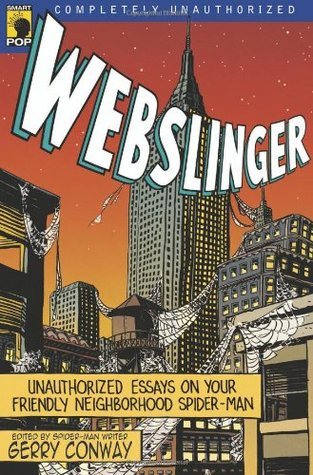
Master Post
Back in 2012 I read a very interesting book called ‘Webslinger: Unauthorized Essays on your Friendly Neighborhood Spider-Man’.
As the title suggests it was an anthology book made up of several different essays about Spidey (and edited by Gerry Conway himself).
The essays are an interesting read, though there are questionable points made and some inaccuracies.
Today though I’d like to debunk some points made in the essay titled ‘The Absent Father and Spider-Man’s Unfulfilled Potential’.
The reason for my desire to debunk parts of this essay is partially due to my inherent instinct to debunk problematic or misinformed stuff surrounding Spider-Man generally. However it’s also partially due to the author, J.R. Fettinger.
Fettinger is the creator and author of the essays found on ‘Spideykicksbutt.com’ and a regular panellist on the Spider-Man Crawlspace podcast. I respect both and the content they provide though there have been times I’ve disagreed with both and other times where quite frankly I think they’ve put forward statements that are outright wrong.
Fettinger and his work was the inspiration to an extent for me even choosing to write so much about Spider-Man, helped bring me back into fandom and his work helped me reconcile some things that I had felt made me an uninformed minority within fandom.
However, there have been times, more and more as the years move forward, wherein my eyes have narrowed at Fettinger’s statements regarding Spider-Man.
He once said something to the effect of ‘alcoholics are just stupid people doing stupid things through no fault but their own’.
He has repeatedly attested that it is morally wrong for Spider-Man and Batman to not simply murder characters like Joker or Carnage.
He has said that Otto’s actions towards Peter in Superior Spider-Man render him the worst enemy Peter has. This is in spite of him being a huge Norman Osborn fan.
He has essentially stated criminal killers like Shriek or Vermin (who suffer from severe mental disorders) deserve no sympathy.
He has said Kraven’s Last Hunt was flawed (to put it more delicately than he did) because Peter ‘never settled his score’ with Kraven.
He has even said that whenever DeMatteis gets into the psychological aspects of the characters he ‘goes off the deep-end’.
These views are most especially chronicled in his on-going segment of the podcast ‘Spider-History’ wherein he takes a month’s worth of (usually 616 Peter Parker) Spider-Man comics from a bygone month decades ago, recaps them and analyses the stories.
However, what is so frustrating to me about these segments as time has gone by is that Fettinger is overly critical and incredibly cynical. He has put forward his opinions as fact with little analysis or consideration of an alternative point of view.
To be blunt with relatively few exceptions he surmises each month in this section as mediocre-bad unless it contained something by Marv Wolfman or Roger Stern, two of his personal favourite runs.
Even then he puts across reductive summaries of the events of the book, in particular phrasing things to make certain characters (like Spider-Man himself) come across as worse than they actually are in the stories in question.
This is particularly a problem in my view because Fettinger’s status as a long read, knowledgeable and analytical fan confers onto him a certain degree of authority in regards to his statements about Spider-Man.
And you know what? It should.
He really does know A LOT about Spider-Man and he has made some incredible assessments about stories and characters related to the wall-crawler.
I cannot recommend you check out his website Spideykicksbutt enough.
But here is the thing...I do not advocate blind trust in his word, or anyone’s for that matter. Not even my own. I know A LOT about Spider-Man but I’m far from infallible.
Think for yourselves, do your own research, present your own arguments and counterpoints.
It’s what I do and why Fettinger frustrates me. Because he’s so belligerent to changing his views, most of which are adamantly cynical and judgemental.
Some people I’ve spoken to about this attribute this to his age. Most of his writing and podcast work has been produced when he was in his 40s or 50s.
It is often said that everyone becomes more cynical, grumpier and more stuck in their ways as they age.
I disagree with that in so far as not everyone becomes like that. And 40-60 is not a point when you are ‘done’ becoming who you are going to be and beyond changing.
It is the prerogative of old men to speak their minds but the WISE men are not adverse to changing them.
This is the root of my problems with Fettinger and his cynicism. Not to mention, I find cynicism simply lazy and foolish under most circumstances. Much as I find Fettinger’s ‘kill all criminals’ mentality to crime to be lazy and foolish.
These thoughts struck me when I re-read his essay from Webslinger. I read the essay upon first discovering his work but I apparently have changed in 6 years as I find much of it ill-considered, cynical, judgemental and problem riddled.
Hence my desire now to debunk it.
The gist of the essay is Fettinger talking about how Spider-Man has lots of unfulfilled potential and attributing this to the loss of his father figure Uncle Ben. He goes on to list off different father figures Peter has had and what the end result of their roles in his life might have been. For context this was written around the time of Civil War 2006.
My first and probably biggest bone of contention lies in how Fettinger frames Peter’s ‘unfulfilled potential’.
It’s here where you start to see his overly cynical and judgemental side.
I will not quote him word for word here because it’d take too long. But early on he writes that Spider-Man’s powers come at the price of his happiness, peace of mind and the normalcy that we all take for granted.
This is partially true but still misinformed.
Peter’s mind is most definitely not peaceful most of the time and his life not normal. But there is that key phrase ‘most of the time’. Not all of the time.
Even during his career Peter has had several moments of grace. Most of the stories transpiring in the immediate aftermath of Mary Jane’s return to his life in ASM v2 #50 come to mind issue #51 even calls out that nothing bad has really happened to get in the way of Peter and MJ’s reconciliation.
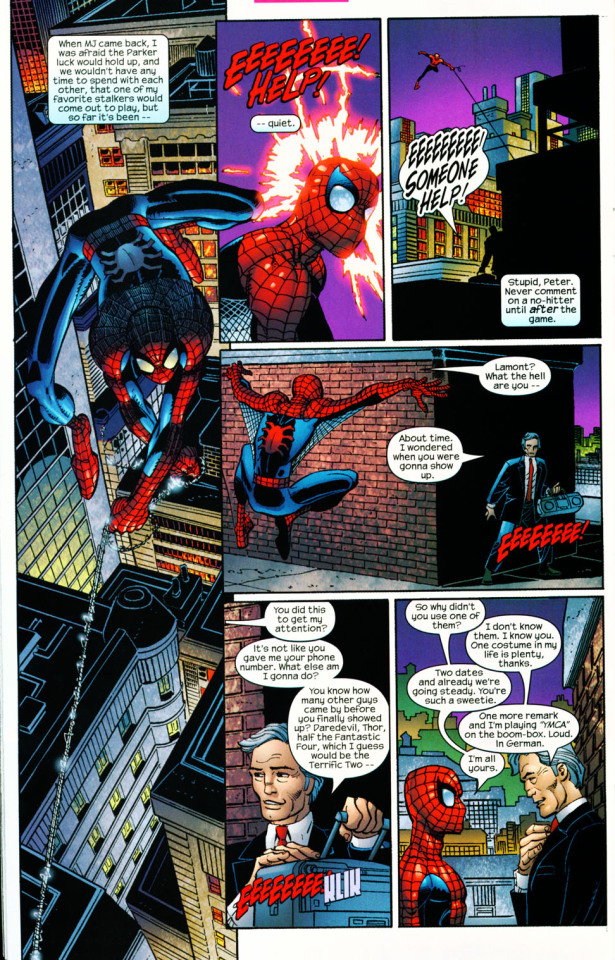
This oversight is particularly egregious since that period had only been a few years before the writing of this essay.
But it’s not as egregious as the other thing Fettinger said. That being Spider-Man has cost Peter his happiness.
Er....no.
There have been many things that have made Peter unhappy in the course of his superhero career but as ASM #500 clearly confirmed for us Peter, in spite of all that, is ultimately happy. Which was a big deal as Peter had just relived all his old battles at once.

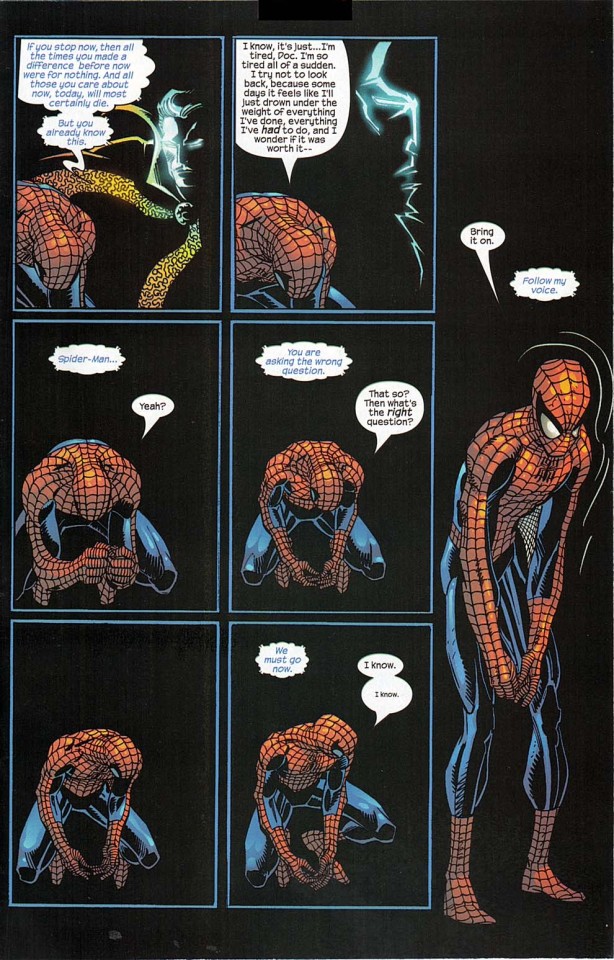
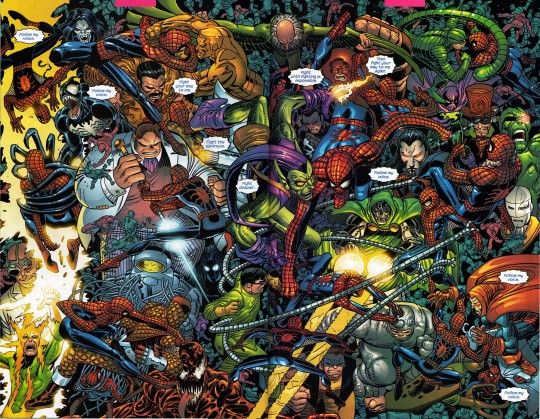


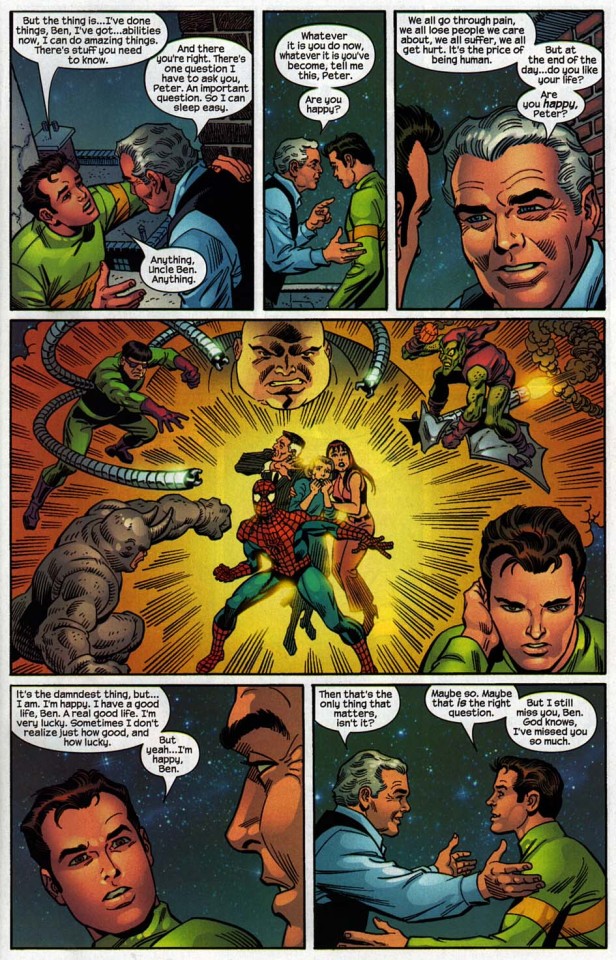
The omission of ASM #500’s ending is telling because Fettinger actively dislikes the story and the scene with Uncle Ben particularly. He’s labelled it as ‘banal’ and essentially said if he could talk with his own deceased father the conversation would’ve gone very differently. Problem is the the story was not about him and his family but about Spider-Man and HIS family!
Fettinger then asks if when Peter dies he’d be labelled as someone who fell short of his potential. He illustrates the point by comparing 15 year old Spider-Man to adult Spider-Man circa 2006.
He claims Peter made few adjustments to his fighting skills. Not true. The older Spider-Man beyond the Silver Age did in fact adjust some of his fighting skills, noticeably in regards to ramping up his speed during combat.


He also took martial arts lessons from Captain America in FNSM v1 #1, putting the techniques he learned from that into practice in the very same issue. That issue was published just a year before Fettinger’s essay by the way.
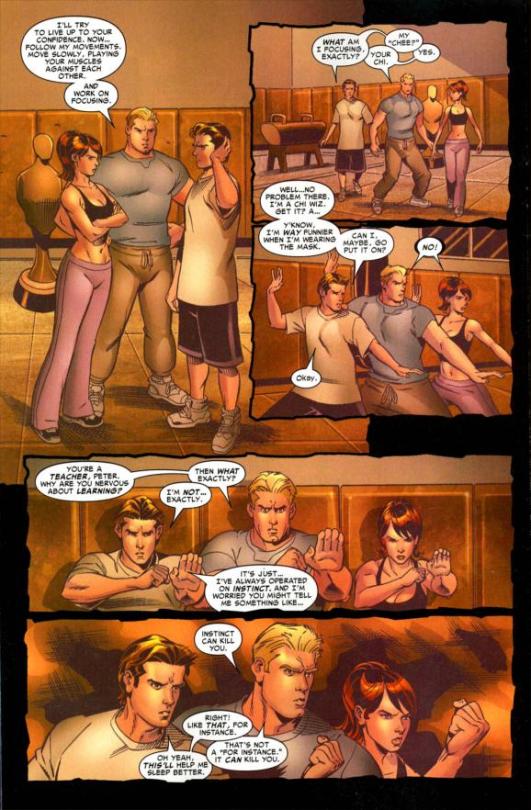

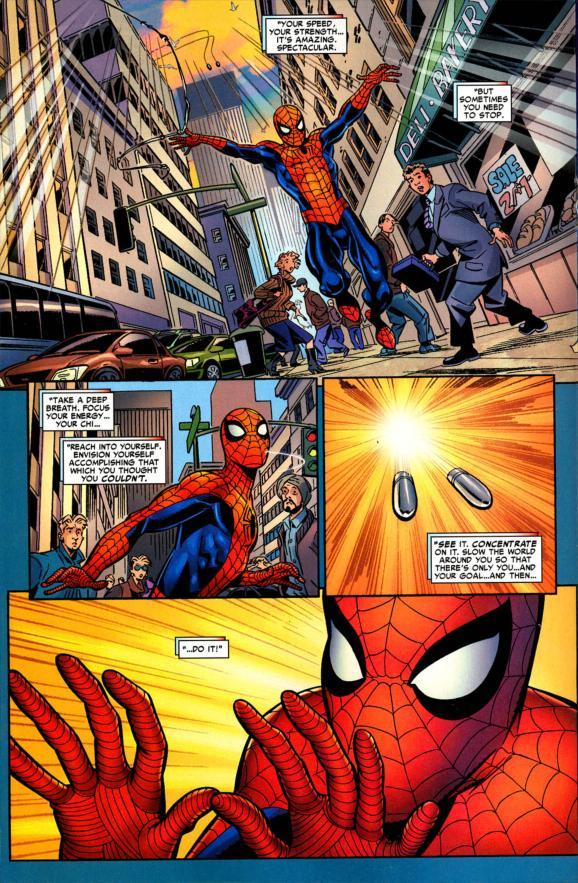
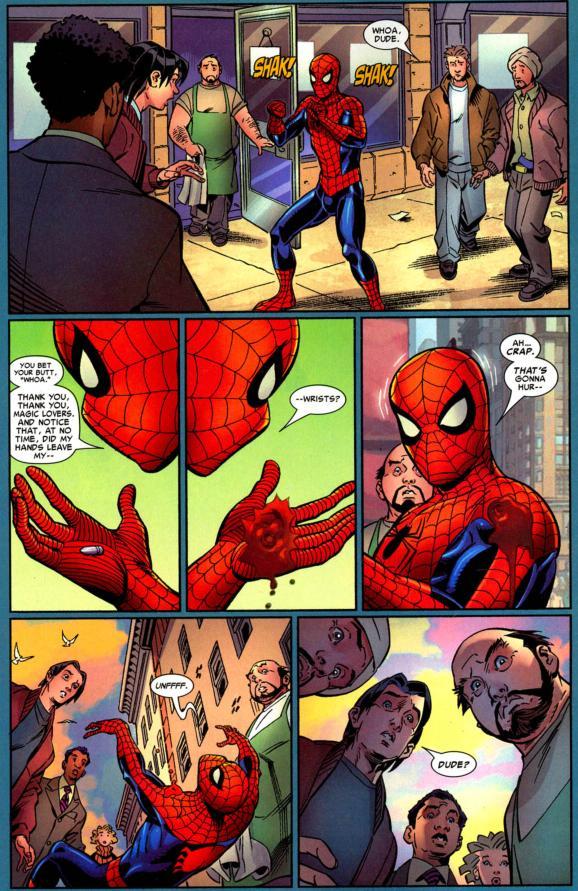
Granted these do not seem particularly significant.
But let’s flip the script a little bit. Let us presume Fettinger to be correct, Spider-Man between 1962-2006 had never evolved his fighting style significantly.
Is that really an example of Peter doing himself a disservice, of not fulfilling his full potential...or is it that the fighting style he had was not only adequate for the life he lived but in fact optimum?
Spider-Man after all has an incredibly effective and sophisticated fighting style. It is impossible to truly replicate by anyone exempting those of similar powersets to himself.
His immense strength allows him to plant himself on the ground and exchange simple punches, kicks, etc. with a lot of power behind them.
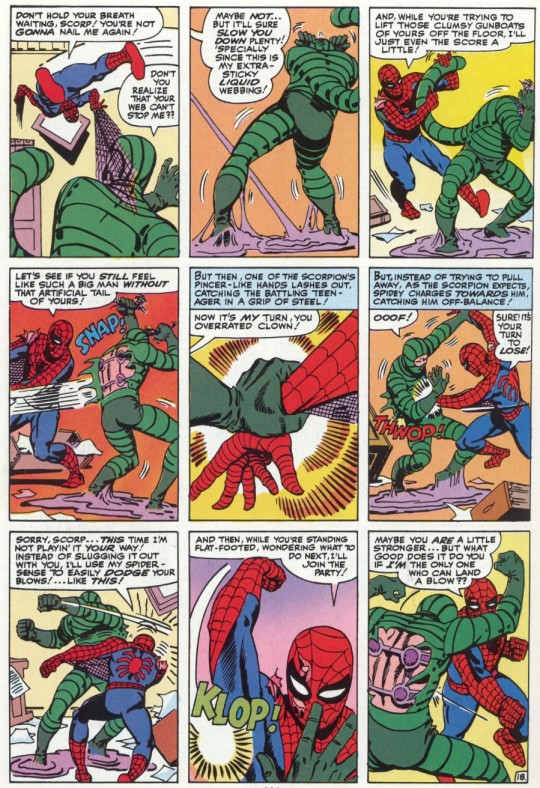
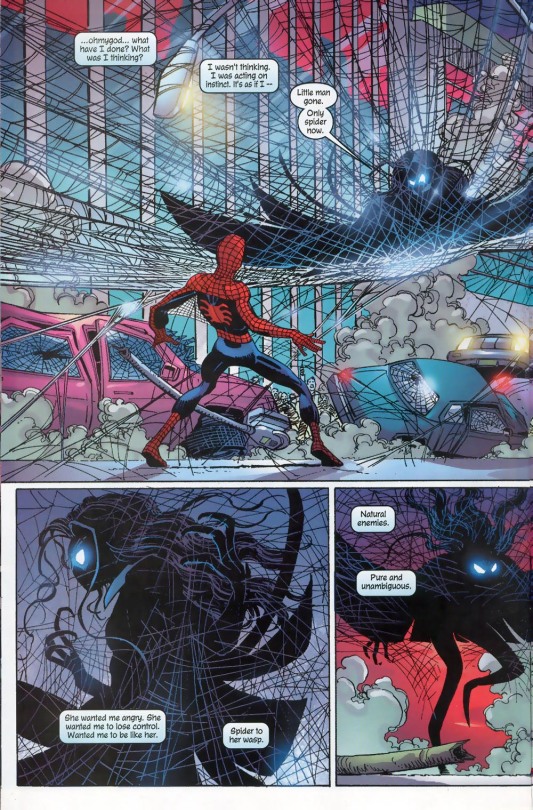
But with more room to manoeuvre his speed, wall crawling, web-slinging and agility allows him to augment that raw power to deliver a lot of hits in a short space of time from a near 360 degree axis. See his battle with Firelord above)for proof of this.
His webs can be used concussively, to distract, to incapacitate and can even act as a defensive shield.

(I know the Spider-Girl image isn’t 616 but it might as well be if you know the contex behind the story)
And then there is his ace in the hole, the Spider Sense. This ability is linked to his reflexes and intuitively enables him to know an attack is coming. It almost automatically makes him adjust his movements accordingly in conjunction with his immense reaction speed and agility.



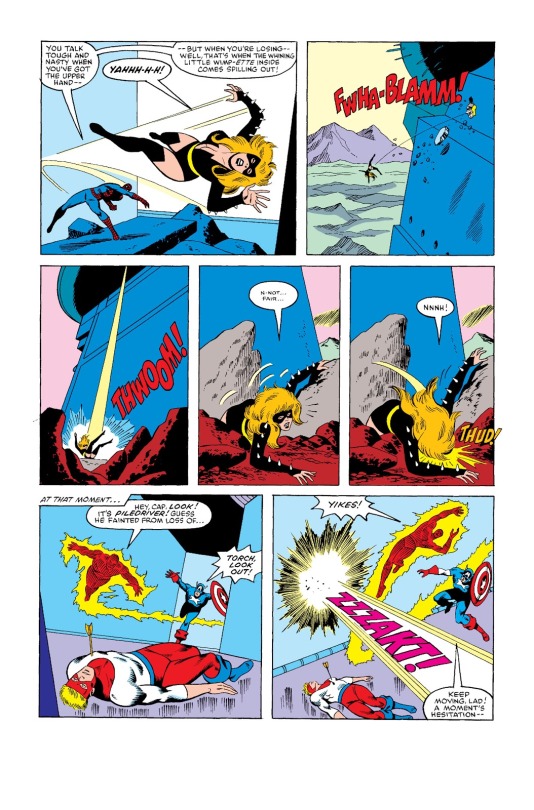
This fighting style had been enabling him to defeat a wide variety of foes across what was then 44 years of published stories.
So was it really that Peter was slacking off in not evolving it? Or was it more that he early on developed something extremely effective that didn’t need any real reinvention?
Moreover isn’t it impressive (rather than a point of condemnation) that Spider-Man essentially figured out the best way to fight with zero instruction or training when he was just a teenager. That’s incredible so it’s far from something to chastise him for simply because he hadn’t radically altered it.
What’s worse is Fettinger claimed that Peter ‘continued’ to rely upon sheer strength, raw intelligence, dumb luck and the stupidity/lack of imagination of his foes to win the day.
Let’s put aside for the moment how Peter has whipped up gadgets or chemicals when needs be.
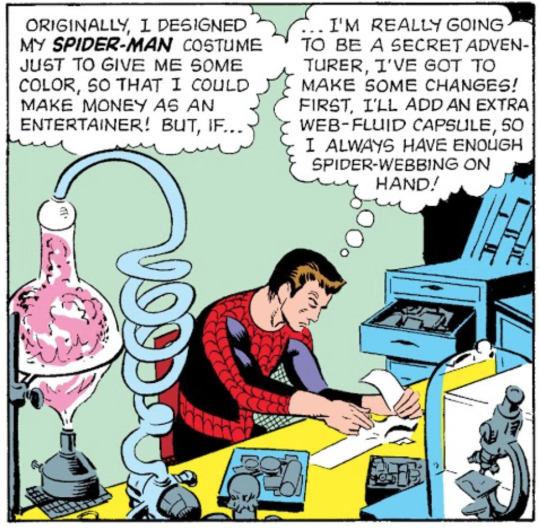




Let’s also ignore how his foes even upon trying new tricks have more often than not met with defeat anyway.


Let’s also entertain the idea that Peter truly does rely upon his foes stupidity and dumb luck in battle. Let’s do that even though he absolutely doesn’t, he’s very rarely just presumed he can win because a villain is dumb, but he has exploited that fact when presented with it; see 99% of Rhino fights. Hell let’s even ignore how Spider-Man uses his speed, and agility and webbing and spider sense in battle as much as his strength.
What exactly is Spider-Man supposed to rely on besides his sheer strength and raw intelligence?
Fettinger is calling Spidey out for relying upon his raw physical powers and his intelligence.
Like...what is an MMA or boxer supposed to rely on besides their muscle and their mind to strategize before and after a fight?
Fettinger continues to point out that exempting his Iron Spider outfit or his alien costume Peter has continued to rely on his ‘wash n’ wear red and blue pajamas’.
There are two waysto view this statement. Either Fettinger is being critical that Spider-Man has not opted to alter his costume aesthetically ever or else never opted to alter it in terms of being functional. That is to say it’s still just a piece of cheap cloth.
Both arguments are invalid criticisms.
Peter has changed his look more than once throughout the years, noticeably he wore a cloth version of his black suit, used two rubber insulated outfits to fight Electro, made an armoured costume in Web of Spider-Man #100 and used four different costumes when he adopted four new identities for himself, all of which were used for different functions.
The black costume however served no function beyond enhanced stealth and Peter retired it due to him and his wife not liking how it reminded them of Venom, a notorious publically known homicidal maniac.
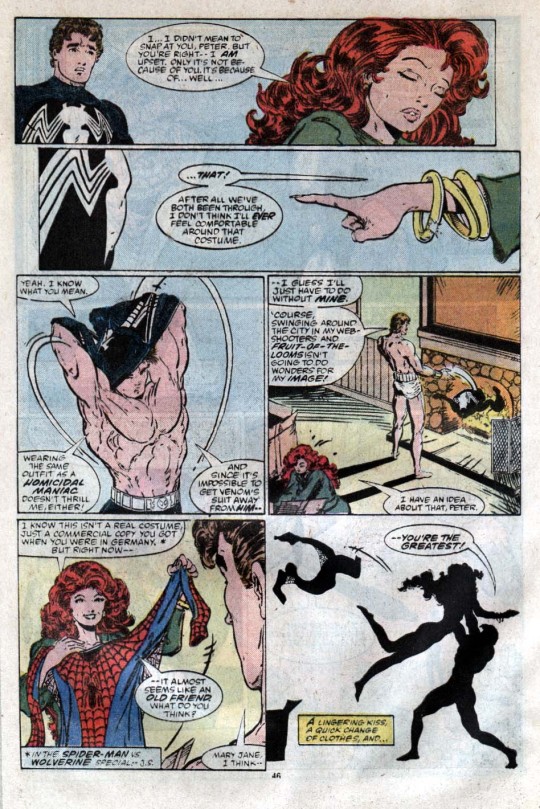
The Armoured suit was only created with access to ESU’s scientific resources, was destroyed on its first mission and realistically was compromising to Spidey’s fighting skills (hence Slott’s version was redesigned). It was also impractical as it was composed of a new hardened version of Peter’s webbing meaning it was never going to last anyway.
His rubber suits were similarly impractical for continual use and severely damaged during battles with Electro. They could not be worn as casually as his standard suit, realistically would’ve impeded mobility to a certain extent and were designed for one specific foe anyway. In fact Spidey usually ran into Electro by chance or else with limited time to intervene in his crimes. Meaning he’d not have the time to locate the rubber suit anyway. Besides...he usually managed to beat Electro without it anyway. After all rubber gloves would be a fairly effective defence and his webbing was itself an insulator. That was his go to in Electro’s debut in ASM v1 #9 and brought up in New Avengers v1 #4.


True Spider-Man trashed his original rubber suit for seemingly no good reason, but since this so aggressively makes no sense I think it’d be safe to presume Peter’s rationale was that the suit itself was ineffective (it didn’t provide full insulation) and was literally held together by glue. The suit was likely unusable after the battle hence why Spidey trashed it.
The four new identities he created though are the hardest to defend. It really doesn’t make much sense for him to have retired those identities beyond the simple fact that, well...the book is called Spider-Man not Hornet/Ricochet/Dusk/Prodigy. I suppose you could go so far as to say pretending to be other people and not using his web-shooters compromised his fighting abilities as he had to consciously move and talk differently as well as use different weapons and tactics. Also maybe he heard about how well multiple alter egos went for Moon Knight. The costumes were to be fair stolen from him and used by other people meaning he’d have had to come up with entirely new identities for himself and ultimately Peter would prefer being Spider-Man having come to see it (for all it’s burdens) as part of who he is.


So contrary to Fettinger’s criticisms, Peter HAS changed his costume, but from a practical/functional point of view there really is little reason for him to permanently make any changes. Or else when he has done so extenuating factors have compromised his attempts.
Meaning all that’s left is Fettinger’s complaint that Spidey never changed the outward aesthetic. Which is not a legitimate complaint about his ‘unfulfilled’ potential. I’ve kept the same posters in my room for many, many years. It doesn’t mean I’ve failed in my potential. It just means I can’t be bothered to change them/I have grown attached to them.
Fettinger continues his train of thought by talking about how Spider-Man’s webbing and web-shooters have not significantly changed since his early days barring his adoption of organic webbing.
I will give Fettinger some leeway here. He never said the webbing/webshooters have remained totally unchanged, just that they’ve mostly remained unchanged. So stuff like Peter equipping a spider tracer trigger to his web-shooters, sedative stingers, impact webbing, an LED light to tell him when he’s low on ammo and adjusting the design and formula of the webbing over time I am lumping all under ‘mostly not changed’.
Even though objectively by 2006 the web-shooters had changed.
But again why does this demonstrate unfulfilled potential?
Spider-Man’s web-shooters are a brilliant feat of scientific engineering/chemistry and have served him well across the decades.
They didn’t need to be radically re-invented.
True, Ben Reilly found ways to improve upon them which Peter later incorporated. Does this not prove Peter was slacking off, of failing to live up to his potential?
Yes and no.
Yes because there WERE improvements he could have made.
But no because Ben had access to Seward Trainer’s scientific resources, less social responsibilities, a lot more time on his hands and was in many ways far less stressed out. As such he was better able to spend time dreaming up those improvements.
Said improvements by the way equated to wearing the web-shooters on the outside of the wrists, sedative stingers and impact webbing and he had FIVE years to dream all that up.
So you know...hardly him re-inventing the wheel.
The truth is if Peter had been in a similar position to Ben, he would’ve likely dreamed up the same improvements.
But he evidently didn’t need to since the web-shooters worked just fine. Ben himself didn’t spam the stingers or impact webbing during his career as Scarlet Spider or Spider-Man. Nor did Peter in the years after he integrated most of Ben’s adjustments into his own web-shooters.
And he did just fine most of the time.
Any further upgrading to his web-shooters, like the kind we saw in Parker Industries, would’ve required access to resources Peter simply didn’t have.
Fettinger continues that Peter’s relationship with the public he serves is tenuous at best.
Again, this is not an example of unfulfilled potential. This is the result of Spider-Man’s reputation being slandered by Jameson and the wider press getting in on the act. This was proven in ASM v2 #39 wherein Aunt May, decades after Spidey began his heroic career, attempted to find a newspaper that didn’t have a negative bias towards her nephew and struggled to do so.
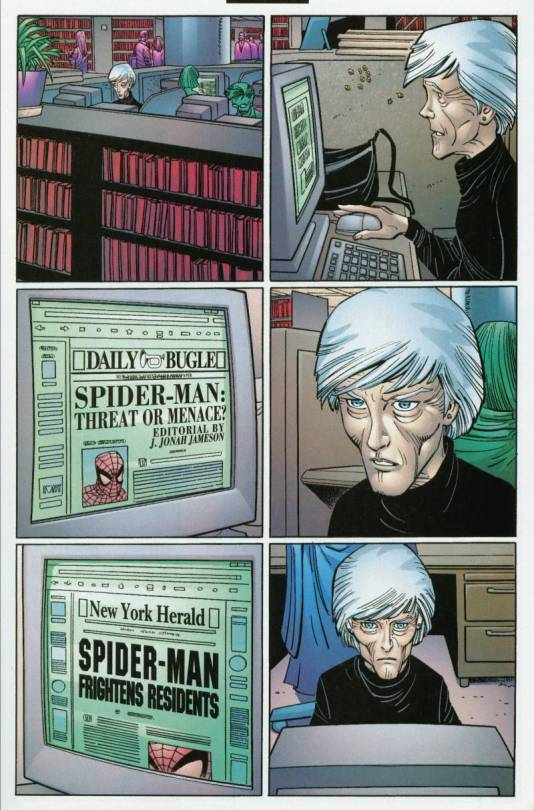
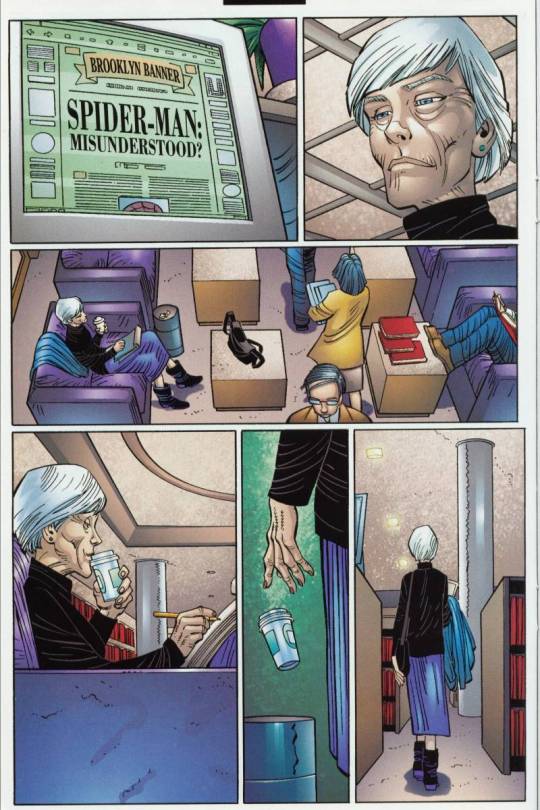
In New Avengers v1 #15 the Avengers attempt to win Jameson over due to Spider-Man’s involvement with the team only for him to turn on the team collectively.
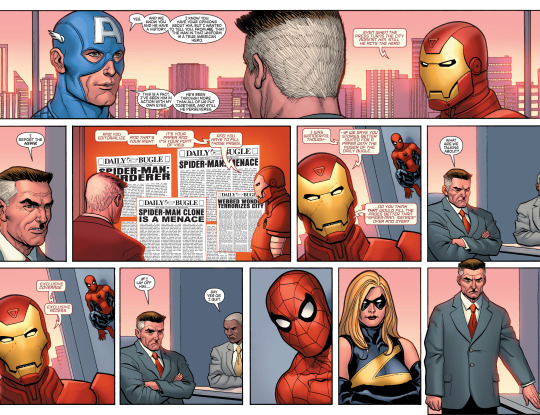
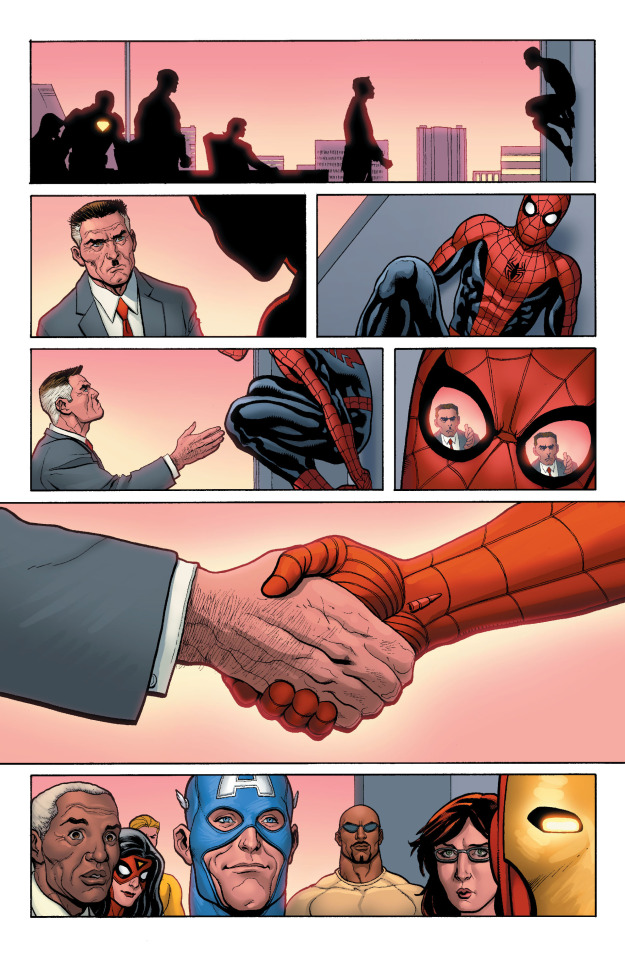
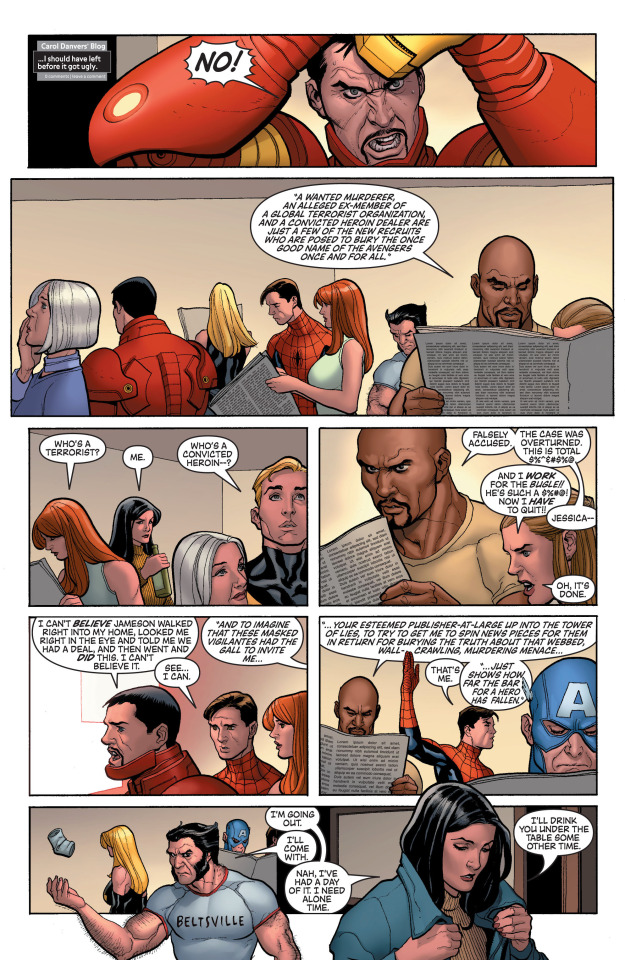
Combine that with:
a) The numerous times Spider-Man has been framed for crimes he was guiltless of
Or
b) The instances where he was deliberately painted in a negative light, such as when he assaulted a seemingly innocent Norman Osborn in Spectacular Spider-Man #250
And it was summarily not Spider-Man’s fault that in his 15 year history his public relations had never been great. Nor was it a negative reflection upon him that he’d been unable to improve them in that time
The public have been fed a particularly strong and buzz worthy narrative for so long that it’d be difficult for him to ever rehabilitate his public reputation without working for the authorities legitimately, being pardoned for any real/perceived crimes he’s been accused of and unmasking publically. Even then it’d be no guarantee.
Not to mention (though Fettinger could be forgiven for not taking this into account from a 2006 perspective) in the world we live in today it’s sadly apparent that news stories about how bad things are simply sell much more than stories about something positive.
Fettinger continues to say that in spite of Spider-Man’s dalliances with team membership his stubborn independence and feelings of inadequacies ensure he remains a loner and at times a fugitive with many heroes regarding him as poorly as the villains he fights.
This for me was possibly the greatest ‘what the fuck’ moment in this essay.
Stubborn independence. Okay, maybe? Although the message of his role in the then current ‘Civil War’ storyline was that surrendering his independence was a bad thing! By unmasking, surrendering some of his independence to Iron Man and working for the government Peter found himself in an inevitable position. He was trapped from doing the most good by a corrupt system. A system that was actively demanding he help do bad things by rounding up fellow heroes and removing their civil liberties. And in the process he made his friends, family, colleagues, students and general acquaintances targets!
Fettinger didn’t know this at the time, but in truth when you follow the chain of events, joining the Avengers is what led to One More Day.
If Peter hadn’t joined the Avengers and let them know his identity, Charlie Wiederman wouldn’t have gotten approval for his experiments from Iron Man.
If he hadn’t performed his experiments he’d have never become a freak.
If he hadn’t become a freak he wouldn’t have eventually burned down the Parkers’ homes.
If they hadn’t been homeless Iron Man wouldn’t have offered them Avengers HQ to stay at.
If they hadn’t been living there Tony wouldn’t have taken Peter under his wing.
If Tony hadn’t done that, if the Parkers weren’t beholden to him for the roof over their heads and if Tony didn’t know who Peter was, there’d have never been an issue about Peter unmasking publicly in support of the Super Human Registration Act.
If Peter hadn’t unmasked publicly Kingpin wouldn’t have put a hit out on his family.
If Kingpin hadn’t put the hit out Aunt May would never have been critically injured.
If Aunt May hadn’t been critically injured there’d have been no need for a deal with Mephisto to save her life.
Joining a team led to one of Spider-Man’s darkest hours and ultimately his greatest defeat.
So you know…maybe there is something to be said for ‘stubborn independence’.
Moving on…feelings of inadequacy? That’s heavily debatable. Again, see ASM #500. Peter was an ultimately happy person. He had a firm sense of pride throughout his life as much as he’d beat himself up. His inadequacies always came in the form of ‘I could/should have done more to help’.
Typically inadequacies manifest as ‘I’m just not worth it’. Even if you disagree and argue they are more like ‘I’m not good enough’ the context is still different. Whenever someone laments ‘not being good enough’, it’s almost always coming from a selfish mindset. Peter in AF #15 was frustrated about his inadequacies before going off on a power trip. But the older Peter’s frustrations were about his inability to do more for others! Superficially they might be called the same thing, but the internal psychology behind them is very different. Fettinger is attributing the former mindset to the latter iteration of the character.
It didn’t even really apply in the early years of the character. After all his problem in ASM #1 when he tried joining the Fantastic Four was about being too cocky (understandable given his age and experience as a performer) than about feeling himself to be somehow ‘not good enough’ for the team.
But then you get to the part here Fettinger claims these inadequacies and independent streak ensure Peter will at times be viewed as a fugitive. And that’s the point where I began to question near damn everything Fettinger has ever said about the character.
That’s not about Peter.
That’s the result of Jameson and super villains. If he wasn’t so independent or felt so ‘inadequate’ then I fail to see how that’d change his situation beyond other heroes disbelieving the news and vouching for him. But his various friends in the superhero community for many years never fully believed such slander anyway, especially since some of them had been victims of similar stuff themselves.
For instance, circa 1996 (let alone 2006) I find it fundamentally unbelievable that Daredevil or the Human Torch of all people would ever honestly entertain the idea that Spider-Man simply assaulted an innocent man in Spec #250 or (beginning in Peter Parker: Spider-Man #88) that he actually murdered low rent thug Joey Z (a crime Osborn framed him for).
More mind boggling though is Fettinger’s assertion that Spider-Man was (and always had been) a loner precisely due to his independence and inadequacy. This is utterly inaccurate because by 2006 Spider-Man was (to much consternation within the fandom) a member of the Avengers!
He’d been one for 1-2 years at the time of this essay’s writing and it’d been a MASSIVE deal. With hindsight we know that to some extent Spider-Man more or less held some form of Avenger’s status up until 2019, around 15 years after he first joined.
The idea of Spidey always being a loner was also aggressively contradicted by Spectacular Spider-Man #75-100. In those issues Peter and his girlfriend the Black Cat formed a crime fighting partnership. Yes they were lovers but the point is Peter was more than capable of accepting an on-going team arrangement. True their team fell apart with the end of their romance, but that had little to do with his independence or his feelings of inadequacy. Peter broke up with Felicia because she’d lied to him and didn’t value him beyond his Spider-Man identity.
That doesn’t touch on his independence at all and more importantly is an example of Peter doing something because he had too much self-respect to continue to be with someone who didn’t value him properly. Which is the opposite of things failing because he had issues of inadequacy.
Heck Spidey at one point tried to form his own superhero team, the Outlaws.
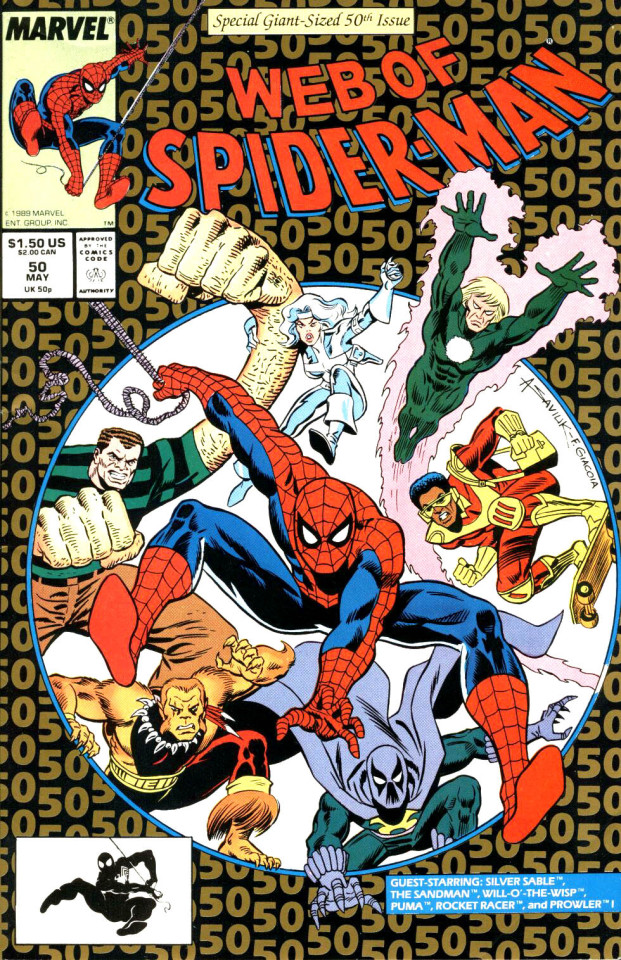
What’s worse is that Fettinger himself wrote a detailed essay about Spidey’s history as a team player.
I’ll leave it there for now. We’ll continue covering the introduction next time.
Master Post
#Spider-Man#Peter Parker#Avengers#New Avengers#Marvel#Marvel Comics#mjwatsonedit#Mary Jane Watson#Mary Jane Watson Parker#mj watson#Norman Osborn#J. Jonah Jameson#miles warren#George Stacy#Captain Stacy#Ezekiel Sims#Black Cat#Felicia Hardy#Aunt May#May Parker#Civil War 2006
10 notes
·
View notes
Link
Thread: I was sent this and felt the need to thread it here on Twitter. It will be long. It is purported to be an anonymous, open letter from a professor at UK Berkeley in the History Department. The only comment I will make is to say it is worth every moment of the read.
C Berkeley History Professor's Open Letter Against BLM, Police Brutality and Cultural Orthodoxy
Dear profs X, Y, Z
I am one of your colleagues at the University of California, Berkeley. I have met you both personally but do not know you closely, and am contacting you anonymously, with apologies. I am worried that writing this email publicly might lead to me losing my job, and likely all future jobs in my field.
In your recent departmental emails you mentioned our pledge to diversity, but I am increasingly alarmed by the absence of diversity of opinion on the topic of the recent protests and our community response to them.
In the extended links and resources you provided, I could not find a single instance of substantial counter-argument or alternative narrative to explain the under-representation of black individuals in academia or their over-representation in the criminal justice system. The explanation provided in your documentation, to the near exclusion of all others, is univariate: the problems of the black community are caused by whites, or, when whites are not physically present, by the infiltration of white supremacy and white systemic racism into American brains, souls, and institutions.
Many cogent objections to this thesis have been raised by sober voices, including from within the black community itself, such as Thomas Sowell and Wilfred Reilly. These people are not racists or 'Uncle Toms'. They are intelligent scholars who reject a narrative that strips black people of agency and systematically externalizes the problems of the black community onto outsiders.
Their view is entirely absent from the departmental and UCB-wide communiques.
…
A counternarrative exists. If you have time, please consider examining some of the documents I attach at the end of this email.
Overwhelmingly, the reasoning provided by BLM and allies is either primarily anecdotal (as in the case with the bulk of Ta-Nehisi Coates' undeniably moving article) or it is transparently motivated. As an example of the latter problem, consider the proportion of black incarcerated Americans. This proportion is often used to characterize the criminal justice system as anti-black. However, if we use the precise same methodology, we would have to conclude that the criminal justice system is even more anti-male than it is anti-black.
Would we characterize criminal justice as a systemically misandrist conspiracy against innocent American men? I hope you see that this type of reasoning is flawed, and requires a significant suspension of our rational faculties. Black people are not incarcerated at higher rates than their involvement in violent crime would predict. This fact has been demonstrated multiple times across multiple jurisdictions in multiple countries. And yet, I see my department uncritically reproducing a narrative that diminishes black agency in favor of a white-centric explanation that appeals to the department's apparent desire to shoulder the 'white man's burden' and to promote a narrative of white guilt.
If we claim that the criminal justice system is white-supremacist, why is it that Asian Americans, Indian Americans, and Nigerian Americans are incarcerated at vastly lower rates than white Americans? This is a funny sort of white supremacy. Even Jewish Americans are incarcerated less than gentile whites. I think it's fair to say that your average white supremacist disapproves of Jews. And yet, these alleged white supremacists incarcerate gentiles at vastly higher rates than Jews. None of this is addressed in your literature. None of this is explained, beyond hand-waving and ad hominems. "Those are racist dogwhistles". "The model minority myth is white supremacist". "Only fascists talk about black-on-black crime", ad nauseam. These types of statements do not amount to counterarguments: they are simply arbitrary offensive classifications, intended to silence and oppress discourse. Any serious historian will recognize these for the silencing orthodoxy tactics they are, common to suppressive regimes, doctrines, and religions throughout time and space. They are intended to crush real diversity and permanently exile the culture of robust criticism from our department.
Increasingly, we are being called upon to comply and subscribe to BLM's problematic view of history, and the department is being presented as unified on the matter. In particular, ethnic minorities are being aggressively marshaled into a single position. Any apparent unity is surely a function of the fact that dissent could almost certainly lead to expulsion or cancellation for those of us in a precarious position, which is no small number.
…
The vast majority of violence visited on the black community is committed by black people. There are virtually no marches for these invisible victims, no public silences, no heartfelt letters from the UC regents, deans, and departmental heads. The message is clear: Black lives only matter when whites take them. Black violence is expected and insoluble, while white violence requires explanation and demands solution.
Please look into your hearts and see how monstrously bigoted this formulation truly is.
No discussion is permitted for nonblack victims of black violence, who proportionally outnumber black victims of nonblack violence. This is especially bitter in the Bay Area, where Asian victimization by black assailants has reached epidemic proportions, to the point that the SF police chief has advised Asians to stop hanging good-luck charms on their doors, as this attracts the attention of (overwhelmingly black) home invaders.
Home invaders like George Floyd. For this actual, lived, physically experienced reality of violence in the USA, there are no marches, no tearful emails from departmental heads, no support from McDonald's and Wal-Mart.
For the History department, our silence is not a mere abrogation of our duty to shed light on the truth: it is a rejection of it.
…
Most troublingly, our department appears to have been entirely captured by the interests of the Democratic National Convention, and the Democratic Party more broadly. To explain what I mean, consider what happens if you choose to donate to Black Lives Matter, an organization UCB History has explicitly promoted in its recent mailers. All donations to the official BLM website are immediately redirected to ActBlue Charities, an organization primarily concerned with bankrolling election campaigns for Democrat candidates. Donating to BLM today is to indirectly donate to Joe Biden's 2020 campaign. This is grotesque given the fact that the American cities with the worst rates of black-on-black violence and police-on-black violence are overwhelmingly Democrat-run. Minneapolis itself has been entirely in the hands of Democrats for over five decades; the 'systemic racism' there was built by successive Democrat administrations.
…
Given the direction our history department appears to be taking far from any commitment to truth, we can regard ourselves as a formative training institution for this brand of snake-oil salespeople. Their activities are corrosive, demolishing any hope at harmonious racial coexistence in our nation and colonizing our political and institutional life. Many of their voices are unironically segregationist.
MLK would likely be called an Uncle Tom if he spoke on our campus today. We are training leaders who intend, explicitly, to destroy one of the only truly successful ethnically diverse societies in modern history. As the PRC, an ethnonationalist and aggressively racially chauvinist national polity with null immigration and no concept of jus solis increasingly presents itself as the global political alternative to the US, I ask you: Is this wise? Are we really doing the right thing?
As a final point, our university and department has made multiple statements celebrating and eulogizing George Floyd. Floyd was a multiple felon who once held a pregnant black woman at gunpoint. He broke into her home with a gang of men and pointed a gun at her pregnant stomach.
He terrorized the women in his community. He sired and abandoned multiple children, playing no part in their support or upbringing, failing one of the most basic tests of decency for a human being. He was a drug-addict and sometime drug-dealer, a swindler who preyed upon his honest and hard-working neighbors.
And yet, the regents of UC and the historians of the UCB History department are celebrating this violent criminal, elevating his name to virtual sainthood. A man who hurt women. A man who hurt black women. With the full collaboration of the UCB history department, corporate America, most mainstream media outlets, and some of the wealthiest and most privileged opinion-shaping elites of the USA, he has become a culture hero, buried in a golden casket, his (recognized) family showered with gifts and praise. Americans are being socially pressured into kneeling for this violent, abusive misogynist. A generation of black men are being coerced into identifying with George Floyd, the absolute worst specimen of our race and species. I'm ashamed of my department. I would say that I'm ashamed of both of you, but perhaps you agree with me, and are simply afraid, as I am, of the backlash of speaking the truth. It's hard to know what kneeling means, when you have to kneel to keep your job.
It shouldn't affect the strength of my argument above, but for the record, I write as a person of color. My family have been personally victimized by men like Floyd. We are aware of the condescending depredations of the Democrat party against our race. The humiliating assumption that we are too stupid to do STEM, that we need special help and lower requirements to get ahead in life, is richly familiar to us. I sometimes wonder if it wouldn't be easier to deal with open fascists, who at least would be straightforward in calling me a subhuman, and who are unlikely to share my race.
The ever-present soft bigotry of low expectations and the permanent claim that the solutions to the plight of my people rest exclusively on the goodwill of whites rather than on our own hard work is psychologically devastating.
No other group in America is systematically demoralized in this way by its alleged allies. A whole generation of black children are being taught that only by begging and weeping and screaming will they get handouts from guilt-ridden whites.
No message will more surely devastate their futures, especially if whites run out of guilt, or indeed if America runs out of whites. If this had been done to Japanese Americans, or Jewish Americans, or Chinese Americans, then Chinatown and Japantown would surely be no different to the roughest parts of Baltimore and East St. Louis today. The History department of UCB is now an integral institutional promulgator of a destructive and denigrating fallacy about the black race.
3 notes
·
View notes
Text
'Being fat is not beautiful. It's an excuse': Revolve accused of fat-shaming with sweatshirt meant to shine light on horrors of trolling

Revolve is being dragged through the mud for releasing a fat-shaming sweatshirt. (Photo: Revolve)
What started out as a well-meaning sweatshirt has led to an uproar on social media over mixed messages about fat shaming and body positivity.
Social issues advocate and artist Florence Given found the sweatshirts on Revolve’s website on Wednesday, with the featured image showing a straight-size model in a pullover that read, “Being fat is not beautiful. It’s an excuse.” Disgusted by the message the sweatshirt sent, Given shared photos of it on Instagram. She also showed another sweatshirt the brand had on its website, emblazoned with the phrase, “Too boney to be boned.”
In tiny print below the quotes, the sweatshirts say, “as said to” beside an Instagram handle, giving the impression that these were comments pulled from someone’s Instagram account. The accounts attributed on the sweatshirts belong to models like Cara Delevingne and Paloma Elsesser.
According to Fashionista, the quotes were comments reportedly said to famous women — but the campaign backfired when the apparel was released early without any context. Since the $168 sweatshirt went up on Revolve’s website on Wednesday, Twitter has been awash with comments bashing the brand for the offensive message.
why is no one talking about revolve selling a “being fat is not beautiful it’s an excuse” sweatshirt, that’s so messed up
— m (@valentisilk) September 12, 2018
Hi @REVOLVE let's talk about why this is so misguided and stupid: https://t.co/YrLAe8yBNP
— Tyler McCall (@eiffeltyler) September 12, 2018
What is there to say about @revolve's decision to include this sweatshirt in their inventory? That they think it's okay and will resonate with their customer base speaks volumes. pic.twitter.com/9x1xXXyBGR
— Lisa Braun Dubbels (@lisadubbels) September 12, 2018
honestly i sometimes wish i covered body positivity all day everyday because i'd love to go IN on this https://t.co/USC2C7SWnU
— Izabella Zaydenberg (@belkabelka) September 12, 2018
Also like may I say that the attribution text is so small as to render my first few reads of the sweatshirt as CHAMPIONING this awful line? You could read the quote a city block away but would have to be in conversational distance to catch the "as said to".
— Jenna Kass is sleepy (@JennaKassArt) September 12, 2018
The sweatshirt got the attention of outspoken actress Jameela Jamil, who posited a rhetorical question for the brand.
Jesus Christ @REVOLVE what are you doing?! pic.twitter.com/Jtv0fHQEpI
— Jameela Jamil (@jameelajamil) September 12, 2018
Tess Holliday, a plus-size model who recently faced backlash from haters over her history-making Cosmo UK cover, also called out Revolve for being “a mess.”
LOLLLLL @REVOLVE y’all are a mess. pic.twitter.com/CrzOkd5oE4
— Tess Holliday 🥀 (@Tess_Holliday) September 12, 2018
“They have a huge following that’s mostly young women and they are perpetuating the toxic idea that our worth is tied into our size,” Holliday said in a statement to Mic. “They must have never seen me, because I’m fat and beautiful.”
Instagrammers were just as angry. “I am actually disgusted and bewildered….. who in the design meeting thought – “hey – I know a good idea” … and what idiotic team agreed with them!!??????” someone commented on Given’s post. “This can’t be real,” another pleaded. “BEING DISRESPECTFUL ISNT BEAUTIFUL ITS DISGUSTING.”
Revolve already has a reputation for its lack of diversity (remember #RevolveSoWhite?) and this sweatshirt is just fanning the flames. According to Fashionista, the largest size available in the sweatshirt was an XL. And that’s a stretch for Revolve, since the brand usually doesn’t sell anything beyond a size L. Just look at its size guide.
The fact that the sweatshirt is modeled on a slender woman is just a slap in the face to curvy girls everywhere.
So…. @REVOLVE thinks its okay to market this sweatshirt — which only comes up to an XL, by the way — by putting it on a thin model? Considering Revolve doesn't even have diverse influencers this is….A Choice. https://t.co/40R1iWTHkp pic.twitter.com/JhdonQbF3Y
— Tyler McCall (@eiffeltyler) September 12, 2018
“Can’t believe this is real? Why wouldn’t they just hire Paloma or another model who has been a victim of this kind of thinking. Do better @revolve @lpa,” someone suggested on Instagram.
As for plus-size representation? If you Google “Revolve plus size” you’ll find it. You won’t find anything in it though; there are “0 items” in the section. Not even the sweatshirt in question.

Revolve’s plus-size section is empty. (Credit: Revolve)
If this was Revolve’s foray into size inclusivity, it appears the brand missed the mark.
Given got a hold of LPA founder Pia Arrobio on Instagram, who explained the idea behind these sweatshirts, which was a collaboration with five women to “shine the light on how horrible trolling is.” The plan was to launch the sweatshirts on Thursday, but they “went up early on Revolve for some reason,” Arrobio tells Given on Instagram, before the context of the quotes was made clear.
View this post on Instagram
UPDATE: heard back from @palomija and she told me she is MORTIFIED about how this quote has been used, and is asking for her quote to be pulled • The brand @lpa responded and they have got @revolve to take down the shots – this is our convo. Problematic marketing = a problem with diversity in the work place. This is still incredibly problematic and an awful attempt at ‘claiming back’ toxic narratives because (in my opinion) it just gives them power by putting them back into the world and at a £162 price tag. The designs went up to XL, so the women who this tee is supposed to ‘empower’ probably wouldn’t even fit into one. But at least we got the pics taken down…Ugh.
A post shared by FLOSS (@florencegiven) on Sep 12, 2018 at 8:23am PDT
One of those women, actress Lena Dunham, distanced herself from the project Wednesday afternoon in a statement, citing Revolve’s presentation of only “thin white women.”
“As a result, I cannot support this collaboration or lend my name to it in any way,” Dunham wrote in part. “This doesn’t take away from my love or respect for what Pia has done with LPA, but I am deeply disappointed in @revolve’s handling of a sensitive topic and a collaboration rooted in reclaiming the words of internet trolls to celebrate the beauty in diversity and bodies and experiences that aren’t the industry norm.”
View this post on Instagram
For months I’ve been working on a collaboration with my friend Pia’s company LPA through parent company @revolve – sweatshirts that highlight quotes from prominent women who have experienced internet trolling & abuse. This is a cause very close to my heart and the proceeds were meant to benefit charities that help young women by empowering them to express themselves through writing and art. Without consulting me or any of the women involved, @revolve presented the sweatshirts on thin white women, never thinking about the fact that difference and individuality is what gets you punished on the Internet, or that lack of diversity in representation is a huge part of the problem (in fact, the problem itself.) As a result, I cannot support this collaboration or lend my name to it in any way. This doesn’t take away from my love or respect for what Pia has done with LPA, but I am deeply disappointed in @revolve’s handling of a sensitive topic and a collaboration rooted in reclaiming the words of internet trolls to celebrate the beauty in diversity and bodies and experiences that aren’t the industry norm. *** I’d like to especially extend my love and support to @palomija, whose quote was the first to be promoted and mangled. She’s a hero of mine. Like me, she gave her quote in good faith and shared her vulnerability in order to support arts education and to spread her message of empowerment, and she wasn’t consulted in the marketing. Not an ounce of negativity should be sent her way. *** My only goal on this planet is to empower women through art and dialogue. I’m grateful to every woman who shared a quote and so disappointed that our words were not honored. As a result, I will be making a donation to the charity of every woman’s choice who was wronged with me and I hope that @revolve will join me with a contribution of their own. *** P.S. This Rubens painting makes me happy because it’s about women joining in love, but he didn’t recognize diversity at all- he just loved curvy butts. Problematic fave.
A post shared by Lena Dunham (@lenadunham) on Sep 12, 2018 at 11:47am PDT
Social media users were unhappy with more than just the way the top was modeled. “[O]kay but why would they sell a shirt like that???” someone commented on Instagram. “Even with the explanation, those shirts are an awful and poorly executed idea.”
When the answer is “The merchandise went up early? Also, fundraising! And bullying is wrong!” to the question “Why are you selling a sweatshirt conflating fatness with laziness?” perhaps a rethink is in order? https://t.co/bJzdtovmHj
— The Immortal Iron Feminist (@lschmeiser) September 12, 2018
This sweatshirt from @revolve is part of a series of things said to different women BUT the truth is you’ve put this on a sample size model .. sizes only go up to a 10, it’s kinda hard to… https://t.co/GBd4avU4vJ
— Curves Become Her (@AartiOlivia) September 12, 2018
“This morning, images of a forth coming LPA collection were prematurely released on Revolve.com,” Revolve told Yahoo Lifestyle. “The capsule collection – originally conceived by LPA alongside Lena Dunham, Emily Ratajkowski, Cara Delevingne, Suki Waterhouse and Paloma Elsesser – was set to debut tomorrow as a direct commentary on the modern day ‘normality’ of cyber-bullying and the shared desire to create a community for those most affected by the epidemic.” Proceeds were set to benefit “Girls Write Now,” a charity focused on mentoring underserved young women and helping them find their voices and tell their stories through writing.
“We at Revolve sincerely apologize to all those involved – particularly Lena, Emily, Cara, Suki and Paloma – our loyal customers, and the community as a whole for this error,” they added. “The collection has been pulled. We are proud to donate $20,000 to ‘Girls Write Now’ in the hopes that those who need it can still benefit from what was to be a meaningful, insightful and impactful collaboration by LPA.”
While the brand admitted the promo shots were poorly executed, they would not comment on how those photos came to be.
Read more from Yahoo Lifestyle:
Magazine editor gets called out for fat-shaming: ‘Why are you using 3 fat and out of shape women for your models?’
Woman fat-shamed by bakery customers gets revenge by buying all the cupcakes
Woman says she was fat-shamed at Universal theme park — and she’s filing a discrimination complaint
Follow us on Instagram, Facebook, and Twitter for nonstop inspiration delivered fresh to your feed, every day.
#Paloma Elsesser#news#Revolve#Lena Dunham#_uuid:c8a887ba-d23b-3de2-869b-bf99c337b44c#controversy#_lmsid:a0Vd000000AE7lXEAT#_revsp:wp.yahoo.style.us#size inclusivity#Cara Delevingne#fat shame#fat-shaming#body positivity#_author:Maggie Parker
2 notes
·
View notes
Text
Say What You Need To Say
As we emerge further into this current era of Black Lives Matter protest and activism, it occurred to me that many of the terms that we've been using to discuss what is currently going on in America and what has been going on for centuries are not well understood by many people, especially non-POCs. On one of my previous blog posts, someone replied to it (thanks, btw) and innocently but incorrectly defined colorism. And that made me realize the importance of everyone and especially white allies being given the opportunity to learn what these important terms mean so that they can then use them appropriately as they continue to advocate for change. This is by no means a comprehensive list, but it is a good place to start for those who want to ensure that they understand what we are advocating for and how they can aptly convey that message. ⋆﹥━━━━━━━━━━━━━━━━━━━━━━━━━━━━━━━━━━━━━━━━━━━━━━━━━━━━━━━━━━━﹤⋆
Antebellum - literally means "before the war"; in America, this term is most associated with the era of slavery in the American South before the onset of the Civil War and subsequent emancipation of slaves and is often referred to with nostalgic undertones which many Black Americans see as problematic slavery romanticism
Bias - when a person favors one perspective or group of people over another; does not need to be based on race or ethnicity Example: I am biased against those who refuse to acknowledge that Michael Jordan is the greatest basketball player to have ever played the game. (That’s right; I said it. Fight me.)
BIPOC - a relatively new acronym that stands for "black, indigenous, and people of color" and includes all non-white people who have suffered at the hands of systemic and explicit racism in a dominant, white society; but specifically highlights black and indigenous people, noting their long history of combating slavery, genocide, and European colonialism Note: It turns out, even I was using this term incorrectly, and I had to defer to information provided by both The New York Times and Dictionary.com for help with this one. I’m definitely learning new things, just like everybody else.
Black Power - a slogan that was popularized by civil rights activist Stokely Carmichael (later known as Kwame Ture) in 1966 to accentuate the need for Black Americans to seek and exercise the agency needed to advance the pursuit of black equality Note: I referenced Encyclopedia Britannica for the year noted above and the correct spelling of “Ture”.
Civil Rights Movement - generally refers to an era that occurred in the middle of the 20th Century during which African Americans and their allies actively protested through marches, boycotts, sit-ins, freedom rides, and other methods to advocate for African Americans, particularly the South, to reap the full benefits of their previously established citizenship rights
Colored - a term once used to officially categorize non-white people; in America, this term most often referred to African Americans, but has largely been abandoned since the mid-20th Century, and modern-day usage is considered offensive Note: This word appears as a part of the acronym for the NAACP, which stands for “National Association for the Advancement of Colored People”. In this context, no offense is generally taken, given that the organization’s origins are dated fairly early in the 20th Century.
Colorism - when a culture and the people within it have embraced a standard of beauty that celebrates those of any race with lighter skin tones because they more closely align with traditional European ideas regarding what features are most attractive
Karen - a term coined by Black America to identify white women who routinely utilize their privilege to instigate trouble or aggression against people of color who are largely innocent of any wrongdoing; this includes instances of being dishonest about a person of color being a legitimate threat in order to invoke fear within that person of color and ultimately establish her power and authority as a white person over them Note: Some white women have attempted to decry this term as a racial slur, but said assertions have largely been ignored, and the term is now widely used by those in the black community as well those of the larger American society who abhor Karen-like behavior.
Microaggression - ideas and statements directed at people of a marginalized group that, on their face, appear to be neutral or even complimentary but are actually reflections of internalized biases that have informed someone’s impressions of that particular group of people; examples include complimenting black people for speaking eloquently, referring to America as “a melting pot”, teachers who fail to prioritize learning how to pronounce a student’s name even after being instructed how to do so, and complimenting boys for showing leadership traits while admonishing girls for being “bossy” Note: Ideas for solid examples were aided by referencing a page on the University of Minnesota’s website as well as a page on the Messiah University’s website.
Negro - another term for black people that was once popular in the United States and used for categorization purposes but has more recently been deemed antiquated and offensive when used Note: This word also appears as part of the acronym for the UNCF, which stands for “United Negro College Fund”, and like the use of “colored” in “NAACP”, is not considered offensive in this context.
Oppression - the act of subverting the growth and progress of a particular group of people often based on the biases held by the predominate group in power Note: Despite the insistence of those who denied the seriousness of the Covid-19 pandemic, being asked to socially distance, remain at home as much as possible, or wear a mask in public in the name of preventing the spread of a deadly illness IS NOT an example of oppression. They are confusing their distaste for not being able to do as they please in order to serve the greater good as losing their civil liberties, most likely because they have had no prior experience having actually lost their civil liberties.
POC - an acronym which stands for "people of color"; it encompasses those of all non-white backgrounds including black, Asian, Latino, and indigenous populations
Prejudice - when one holds a pre-established belief of particular groups based on race, ethnicity, gender, religion, sexual orientation, sexual identity, or similar social categories; the person with this mindset often believes that those who do not share the common attributes with which he or she identifies is therefore less worthy of having their humanity acknowledged and respected Note: This does not require one to exert power such as with racism. Therefore, people of color CAN be guilty of exhibiting prejudice against white people.
Racism - an umbrella term used to describe a system of beliefs in which those who are in power value their own race ahead of the needs and importance of other races and believe they are wholly deserving of this power; without power, there is no racism
Reconstruction - refers to the period of American history that occurred after the Civil War during which specific initiatives were implemented to ensure that Black Americans who were no longer enslaved were able to establish themselves as free persons and exercise their citizenship rights. This included efforts by Northerners to prevent former Confederate Southerners from exercising retribution against the formerly enslaved and working to establish ways in which Black Americans could exercise political power. This period was cut short, however, due to many reasons but largely because continued involvement in Southern affairs no longer appealed to many Northerners, and they had grown tired of issuing the necessary funds to pay for its continuation. This failure directly contributed to the establishment of the Jim Crow South and other policies that greatly inhibited the advancement of Black Americans after emancipation.
Reverse Racism - a fallacy; often used to describe an instance when white people believe that a person of color, specifically in America, is inflicting pain and suffering in some way upon white people solely due to their race; despite the assertions of white supremacy apologists, this is not a real phenomenon, because a key component of racism is power, which people of color in America DO NOT have
Stereotype - ascribing a specific characteristic or trait to everyone who belongs within a particular community to further insinuate that they are all the same; they can be positive ("Americans are all rich") or negative ("Black people do not like to read"), but they are often oversimplifications of complex individuals within an even more complex culture and are, therefore, largely inaccurate
Systemic Racism - a specific subset of racism that refers to the ways in which practices of subjugation have been embedded into the core fabric of a system and continuously upheld in order to deny people of certain races access to opportunity, prosperity, and power
Systematic Racism - a specific subset of racism that goes beyond just the bigotry and hateful acts of individual people who are racist but also includes a larger structure or methods through which these racist people can thrive and continue to exercise their bigotry and even join forces
White Fragility - a term that refers to the prevailing sense among people of color that, historically, white Americans have been catered to and placated to the extent where now many of them greatly object when they no longer experience such treatment; it is, in part, the perception that some white Americans believe everything revolves around their comfort and feelings, and ideas and initiatives in conflict with that should be avoided at all costs Note: This term also refers to a tendency described by author Robin DiAngelo in which some white people become defensive when asked to discuss issues of race and racial inequality and “lack the racial stamina to engage in difficult conversations”. While I concede the validity of this definition, I also contend that the aforementioned issues are also at play. As such, when I use this term in my writings, I am referencing my more encompassing definition. Perhaps that’s not “allowed”, but it’s my blog, so I’ll do what I want. 😁
White Guilt - a sentiment in which white Americans acknowledge that racism still exists in America and might thus feel compelled to act in ways that they feel will atone for that, even if those acts are themselves couched in racist ideology; it can also prevent white Americans from wanting to hear or learn more about past transgressions against people of color because doing so is uncomfortable for them
White Privilege - the benefits that come with being white in America that allow for one's advancements to not be inhibited by one's race; it does not mean that white people do not deal with their own forms of adversity, but those impediments to their success are not based on the color of their skin
White Supremacy Apologists - those who may not necessarily subscribe to overtly racist ideology themselves but continue to allow and make excuses for those who do; they may also lend their support to policies and practices that are more covert instances of racism which hide under the guise of more innocent pretenses such as opposing initiatives like forced busing in order to integrate schools and claiming that this stance is due to a desire to preserve “neighborhood schools”
White Tears - a term that is also associated with white fragility in that, once a white American has experienced that aforementioned discomfort or perhaps is confronted for exhibiting racist behavior, they will sometimes weep or otherwise display visible sorrow that is not necessarily reflective of feeling regret for the harm they have caused others as much as it is self-pity now that people are upset with them in ways that might lead to additional consequences previously not anticipated
Womanism - a term coined by author Alice Walker to encompass the activism of black women who have found themselves to be left of out the gains of feminism because they are not white and the gains awarded to black men in the name of civil rights because they are not men.
Xenophobia - a term that reflects either an individual's or a culture's belief that the race and ethnicity that is predominant in a particular country is superior to others, and those who do not belong to that predominant culture but wish to emigrate to that country are unwelcome; often denotes fear and/or hatred as a motivating factor Note: I referenced Dictionary.com to help me craft a more comprehensive definition.
⋆﹥━━━━━━━━━━━━━━━━━━━━━━━━━━━━━━━━━━━━━━━━━━━━━━━━━━━━━━━━━━━﹤⋆
I figure that’s enough for now. If needed (or requested), this list can be revisited and updated to include more pertinent terms. I hope this was helpful in some capacity as we all work to navigate this new more inclusive, more accepting, and less hateful America that we are actively trying to mold.
#BlackLivesMatter#BLM#womanism#womanist#LanguageOfRevolution#therandomthoughtsofmybrain#DefiningTerms#SayWhatYouNeedToSay#LifetimeLearning#WhatDoesThatMean#InformedActivism
0 notes
Link
Hello Board of Directors—
I am writing to you at 3:40am because I can’t sleep.
Many of you don’t know me and probably will never have any interaction with me beyond this point but I wanted to introduce myself.
I am marcus d. harvey (all lowercase letters) and I have been a teaching artist at YOUR ORGANIZATION for over 11 years now. Maybe you know my name as I have worked with one of the signature programs pretty much exclusively since my time at YOUR ORGANIZATION.
I hold my undergraduate degree from UNC-Chapel Hill, a graduate degree from NYU and a graduate degree from Brooklyn College. I am an actor. I am a director. I am a writer. I am a college professor. I am a mentor. I have been stopped by the cops, racially profiled, called the N word. I have been overlooked by jobs not because I didn’t have the qualifications but merely because my blackness makes white people feel uncomfortable (I have been told that by people “off the record”). You wouldn’t know anything of that by looking at me. What you will know by seeing me is that I am black and male and there is nothing any of you can do about it.
For years, I have worked at YOUR ORGANIZATION with a smile on my face and my head held high because I believed in the work of YOUR ORGANIZATION, or at least I used to. I have survived YOUR ORGANIZATION through many transitions and yet I am only part-time. I am asked about students who have been through your program by grant writers and others, but yet I am not on staff full-time. I watched someone who worked under me as a teaching artist, a white man, get a position where all of a sudden I had to report to him and seek his approval for even being in the room. Within YOUR ORGANIZATION, there is systemic racism.
YOUR ORGANIZATION, like most arts nonprofits, will romanticize the struggle of black and brown children to donors and sponsors while many of the staff in the office of these organizations are white. Do you recognize this as a problem? I, a black man, have always had to report to someone white about a program dealing with a black playwright. Think about that for a minute. My blackness has to be approved by white supervisors. That is systemic racism. I, a black man, have had to sit in training sessions led usually by non-black people on how to deal with black and brown youth. That is systemic racism. My entire existence within YOUR ORGANIZATION is on the approval of the white people who “approve” my work and my timesheet. That is systemic racism.
If you are uncomfortable with this email, imagine being me, I have been uncomfortable for some time now and afraid to say a word out of fear. Fear that the whiteness around me will see me as problematic and I would be let go. That is systemic racism.
I am NOT asking you to make room for me at the table where you currently sit. I am asking you to examine who’s at the table, dismantle the table and build a new table that will make room for people like myself to sit.
As the board of directors, I imagine part of your obligation is to guide and direct the organization towards growth but how can an organization grow when it doesn’t examine itself internally. When I say internally, I don’t mean hiring an outside organization run by white people to take a look at the systemic racism within YOUR ORGANIZATION; I mean by inviting black people at YOUR ORGANIZATION into the room to be heard and seen. If there are not black people at YOUR ORGANIZATION, ask yourself WHY?
It appears black lives only matter when it’s time to raise money but otherwise black lives are erased and black voices are muted.
What is the action plan of YOUR ORGANIZATION going forward? How will YOUR ORGANIZATION make room for voices that are black and male in the room? When will black lives matter?
Here’s the reality, at any point, my black maleness can be seen as a threat and I could be taken at the hands of the cops simply by existing. At any point I can become a hashtag.
What will YOUR ORGANIZATION do to ensure the safety and growth of black people who are on the frontlines doing the work stated in the mission statement?
It is no longer acceptable to sit in silence, while you have the power to examine yourselves and impact the change needed within the organization.
In the arts, In education,
marcus d. harvey
— Update:
As a board member responded to my email, the response reminded me how much systemic racism in rooted in who sits on these boards and who nurtures and guides these organizations to higher heights. It was clear my voice was heard and email wasn’t read. I have to ask: When will there be a new wave of leadership? When will black lives and black voices matter in arts education? To board members everywhere….What are you willing to sacrifice for my freedom?
—
marcus d harvey is an award-winning actorvist, director and writer. He holds degrees from UNC-Chapel Hill, New York University and Brooklyn College. He’s a teaching artist at various organizations, mentor and an adjunct professor of Acting. Website: www.themarcusdharvey.com Twitter: @marcusdharvey
0 notes
Text
Letter to the MIT community regarding engagement with Saudi Arabia
The following email was sent today to the MIT community by President L. Rafael Reif.
To the members of the MIT community,
Last October, following the assassination of journalist Jamal Khashoggi, I asked Associate Provost Richard Lester, who oversees MIT’s international activities, to reassess MIT engagements with Saudi entities. On December 6, Richard shared his preliminary report and recommendations with faculty, students and staff, and he asked for comments. Last week, Richard sent me a letter that summarizes and reflects on the community comments, adds several recommendations and offers some new information, including funding amounts from Saudi state sources.
You may read what Richard sent me here, including both his recent summary letter and his report from December. Together these constitute the Lester report.
I write now to share my view of how MIT should proceed in this complex situation.
The Lester report
The Lester report defines the three types of engagements that people from MIT have with entities in Saudi Arabia: sponsored research backed primarily by entities affiliated with the Saudi government; research and education programs funded by gifts, mostly from private Saudi foundations; and a few smaller connections, including executive education and Industrial Liaison Program memberships.
The report explores the full range of competing factors to consider, including faculty autonomy, the social and scientific value of the work we undertake with Saudi people and entities, the challenge of working in a nation so out of step with our commitment to inclusion and free expression, and our community’s deep sense of revulsion at actions of the Saudi regime.
Ultimately, the report concludes that if MIT faculty wish to continue their current engagements with colleagues, students, and public and private research sponsors in Saudi Arabia, they should be free to do so, as long as these projects remain consistent with MIT policies and procedures and US laws and regulations. It also proposes that if faculty members wish to disengage from Saudi projects in light of recent events, we should help them, including smoothing the transition for the teams involved. And it recommends ways to make sure that international projects with countries whose governments engage in troubling behaviors go through a specified review process before they are allowed to proceed or be renewed.
I offer some background to explain why I agree with these recommendations.
Some background on MIT’s Saudi relationships
I know many of you find the behavior of the Saudi regime so horrifying that you believe MIT should immediately sever all ties with any Saudi government entities. I share the sense of horror, and I have great respect for that point of view.
However, my experience leads me to see our Saudi engagements differently, and therefore to believe that cutting off these longstanding faculty-led relationships abruptly in midstream is not the best course of action.
For decades, MIT has strongly favored a strategy of engaging with the world and of opening the door to collaboration where our faculty see a significant opportunity to do constructive work. In this spirit, in 2007, when I was provost, faculty in Mechanical Engineering sought to begin working with King Fahd University of Petroleum & Minerals (KFUPM) on solar energy, seawater desalination and design education.
Because MIT had no formal mechanism for reviewing international engagements, I established the International Advisory Committee (IAC). The IAC co-chairs guided a review of the proposed KFUPM engagement, which included a representative, independent faculty group making a site visit to assess various concerns. The resulting report allowed the project to proceed, and in 2008 the Center for Clean Water and Clean Energy at MIT and KFUPM was launched. Because KFUPM is all male, a condition of the engagement was that the organizers create a path to scientific education for Saudi women; this inspired the Ibn Khaldun Fellowship that brings Saudi women PhDs to MIT.
Since that initial engagement, I have come to know many Saudi citizens, including MIT alumni, Saudi officials and industry leaders working to modernize Saudi society. I have also met Saudi students and postdocs, both women and men, who dream of helping their society participate in and contribute to the global scientific community. Through these contacts, I have been struck by the intensity of their commitment and the value of their efforts to use research and education to make progress for themselves and their society. And of course, knowing these individuals, it is impossible not to see them as separate from the regime they did not choose and cannot control.
Saudi Arabia faces an unusual demographic moment: More than half of Saudi citizens are younger than 30. In such a society, building knowledge and helping more people gain access to higher education constitute the surest path to social progress. This is why I have felt confident that allowing interested faculty to continue to engage constructively with Saudi students, postdocs, alumni, colleagues and sponsors whom they trust and respect is consistent with our mission to advance knowledge and educate students for the betterment of humankind.
How should we move forward?
The present moment is testing that position. When I agreed to host the Saudi state delegation at MIT last spring, I shared the hope of many in the US and around the world that the visit and official engagement were an important part of an ongoing process of reform and modernization. I know some of you were and remain disappointed by that decision, and I understand that disappointment.
As many of you have made plain, in the present situation, if MIT simply continues to work with Saudi state entities without comment, we risk having our silence taken as an endorsement of the regime’s behavior – an unacceptable result.
For the record then, let me be clear: MIT utterly condemns such brutal human rights violations, discrimination and suppression of dissent, including the murder of Jamal Khashoggi.
Nevertheless, I hope we can respond to present circumstances in a way that does not suddenly reject, abandon or isolate worthy Saudi people who share our principles and are doing good work for themselves, their society and the world, particularly if MIT faculty wish to continue the engagement.
The way forward will include carefully and thoroughly reassessing these engagements if faculty seek to renew them. This practice will of course apply to proposed new international engagements as well. To do this well, we need to reexamine aspects of our assessment process and find ways to improve them.
Strengthening our system of assessment
Indeed, many of you have suggested to both Richard and me that MIT develop stronger processes to assess our international engagements in general.
As Richard describes in his summary, we have a head start on this. With just this goal – and considering engagements in a range of nations beyond Saudi Arabia – we have been working over the last 18 months to revamp our existing procedures and groups, including reconstituting the IAC as a faculty-led, standing committee of the Institute.
Already, the IAC is better equipped to vet potential new international engagements and those up for renewal, including those with foreign state entities; to assess whether, weighing all the relevant factors, a given engagement is advancing MIT’s core academic mission; and to advise on the right course of action. At the same time, we are developing new administrative practices for assessing the complex risks that international projects may pose. We will systematically coordinate these two approaches, to make sure that MIT’s international engagements receive a thorough review.
Many of you also observed that we have an opportunity now to consider further questions about how we might approach international engagements in problematic countries. How could we include a broader range of community voices? What’s the best way to tap our faculty expertise in fields like history, political science, anthropology, philosophy and more? Can we offer our campus community new ways to gain a fuller understanding of the countries we engage in? Is there a general standard that could be applied in such cases? Are there further steps we can take to make sure that our engagements are not only in tune with but advance MIT’s values, including equality and free expression?
The faculty officers – Chair Susan Silbey, Associate Chair Rick Danheiser and Secretary Craig Carter – have agreed, at my request, to create an ad hoc interdisciplinary committee of faculty, staff and students to consider such questions. The committee will report to the MIT administration by this coming September. They will offer guidelines for action as well as expertise to call on when MIT assesses new international engagements.
I am deeply grateful to Susan, Rick and Craig for taking on this important assignment; I believe the work of the ad hoc committee will be of great value in MIT’s development as a globally engaged university.
* * *
I close by thanking Richard for his tremendous care and effort in leading this reassessment, and by thanking everyone in the community who has taken the time to contribute their perspectives on this sensitive and complex topic. One can only be grateful to belong to a society that guarantees each of us the right to openly express our opinions, and to a community that takes so seriously its obligation to wrestle honestly with its most difficult challenges. We all become smarter and wiser by thoughtfully engaging one another and taking advantage of such a precious right.
Respectfully,
L. Rafael Reif
Summarizing Filtration-Products.com: Filtration-Products.com website posts the most up to date announcements, statements and purification products from the separation business. Filtration-Products keeps you current on purification and all the major technical break throughs including wound filters, pleated filtration, melt blown depth filters, bag filtration, RO filtration, from brands such as Axeon manufactured for air purification, and anything else the purification field has to announce.
from Filtration Products http://bit.ly/2Bpyllt
0 notes
Photo

New Post has been published here https://is.gd/Oq9jEE
A Psychic Visit with Nouriel Roubini: The Mother and Father of All Crypto Skeptics
This post was originally published here
–––––––––––––––––––––––––––––––––
Admit it – you already hate that this article exists.
That itself is no small testament to the man it’s about, Dr. Nouriel Roubini, the outspoken economist and professor whose tweets, interviews and public testimonies this year have seemed to treat the entire cryptocurrency movement with all the tenderness of an insubordinate prison inmate.
In the process, Roubini has arguably become the embodiment of an incumbent intellectual class that sees cryptocurrency as responsible for not just a massive price bubble but a flurry of frauds and scams that have bilked consumers out of billions with the promise that their token of choice could eradicate everything from poverty to disease.
“The mother and father of all bubbles gone bust?” That’s still how Roubini describes what others have called the next internet, and if there’s any hope he’ll soften his stance when the cameras aren’t rolling, Roubini quickly snuffs it out.
“The words are not a provocation,” he reaffirms.
In person as in video, he draws almost no distinction between the technology and the admittedly opaque industry that has sprung up around it, even going so far as to dismiss bitcoin’s answer to the double-spend problem, its core technical innovation, as having earned it a spot in a “future museum on clever economics of the past” – and little else.
Over two days of interviews, this is the closest he’ll get to a compliment.
Still, if there’s a moral to our sprawling conversations, it’s this: while innovators in the crypto community are quick to demand that others see their vision (and overlook their faults), Roubini is living proof they aren’t always so empathetic as to extend this courtesy to others.
Indeed, what’s surprising in Roubini’s case is how unilaterally he’s inspired hostility. He is, after all, no recent apparition in the world of economics, where he’s hovered between rock star and also-ran status in the decade since his 2006 prediction of a global financial crisis. Further, he shares many of the same critiques of the financial system as cryptocurrency enthusiasts.
Have you ever stopped to read any of Roubini’s articles? Have you actually read his 37-page testimony before the U.S. Senate? (He has a suspicion you haven’t.)
But if Roubini is to blame for his gleeful hyperbole, admittedly casual grasp of technology and a command of English that betrays his long journey to the U.S., then crypto enthusiasts are guilty of not making an effort to read past his soundbites and understand his arguments.
From his office at New York University, Roubini is keen to first direct the dialogue to the scars he’s accrued in the resulting war of words. Denial-of-service attacks, death threats, spam emails – if Roubini sees the worst in cryptocurrencies, he’s seen also the worst in their supporters.
With a leg on a desk, he breaks apart a Kind bar as he discusses his response.
“When people try to bite you… Not just barking but biting dogs… An eye for an eye and a tooth for a tooth…” he says, later pursing his lips to punctuate the lingering sentence.
Behind a desk, there he is, finally, the weary professor wondering what the hell happened in class while he was in the hall.
First, a few grievances
Sorting the good from the bad in Roubini’s arguments, however, is a tall order.
If Roubini is at best a passionate defender of economics and the canon of learning it comprises, he often does himself a disservice in conversation.
A fair amount of that appears to stem from two factors. One, Roubini’s convictions are actually fairly simple, and two, he often buries his point under responses to tangential topics.
Roubini looks at his phone in his offices at New York University.
Asked about the specifics of his own research, Roubini is quick to give an answer, citing a study he’s read on the high rate of ICO failures – “in any legitimate industry, you don’t get 81 percent of scams in the first place,” he says – that is, before he starts decrying crypto’s association with alt-right ideologies and anti-Semitic conspiracy theories.
Asked if bitcoin can be viewed separately from other cryptocurrencies, with less mature code or markets, he gives a strong response – “bitcoin is based on blockchain and cryptography and authentication based on proof of work” – before turning the subject to how it’s “AI, machine learning and a combination of big data and internet of things” that will revolutionize finance.
“Ninety-nine percent of anything crypto and blockchain is vapourware,” he continues.
In Roubini’s mind, there’s a clear connection between all these points. However, it’s hard not to feel like Roubini is sometimes avoiding your question or simply using it as a vehicle for whatever point or grievance he was going to air in the first place.
For example, it’s the accusation that he’s in the pocket of banks that seems to get the most airtime and ire, despite the fact this isn’t brought up in any questioning.
“That’s nonsense. I’ve written about the financial crisis and the distortions that lead to the financial crisis,” he says, adding of his detractors: “They don’t know anything about money so they want to reinvent everything, decentralize everything.”
My attempts to halt the flow from topic to topic seem to do little to break Roubini’s momentum, and next, we’re on to how he’s been unfairly categorized as anti-innovation.
“People tell you are a dinosaur, they throw you this nonsense. If you believe in innovation, you have to believe in blockchain or crypto. It’s become a fad,” he says. “There are thousands of fintech companies, they’re not going to give you a shitcoin.”
If you’re about to tune out now, re-read the sentences above. In short, Roubini believes crypto isn’t working because it isn’t delivering results, that crypto entrepreneurs demonstrate a poor grasp of economics and that they underestimate the impact of other technologies.
So far, nothing all that objectionable. Later on, he offers a more subdued take, one that is unusual as it could be characterized as a sober and salient distillation of his views.
“I try to give you the skepticism of an economist. I may not understand anything deep about technology,” he says. “My view is that models of digital and mobile payment systems are working, and they all have to do with fintech.”
A detour to Death Valley
Still, if Roubini can be lauded for strong convictions, deeply buried, it’s hard to tell how exactly he’s arrived at some of his conclusions. Is he someone who studies deeply or goes with his gut?
It’s a question that has been asked about Roubini before, most notably in his New York Times profile entitled simply “Dr. Doom.” “When the economist Anirvan Banerji delivered his response to Roubini’s talk, he noted that Roubini’s predictions did not make use of mathematical models and dismissed his hunches as those of a career naysayer,” an excerpt reads.
Indeed, in our conversation, Roubini seems to see-saw between implying his opinion is driven by research, and at other times, indicating it’s simply the result of spotting human nature.
In fact, the latter appears to be a common denominator in the predictions that have defined his career to date – his sentiment on the U.S. housing bubble and the crypto crash were both inspired, he says, by moments in which he was able to recognize realities beyond numbers.
“I was in Basel for Art Basel [in December 2017]. Thousands of people go there because it‘s big parties and they don’t know anything about art, and everybody was telling me, ‘Should I buy bitcoin?’” he recalls. “Price action every day has nothing to do with fundamentals. Even strangers come up to you and say, ‘Ah Roubini, should I buy bitcoin?’”
“It was the same light bulb that I drove to Vegas and Death Valley, and I saw thousands of empty homes, people brainless. FOMO is the driver of every bubble,” he continues.
Alone, the blurry lines between Roubini the researcher and Roubini the soothsayer might not be much for conversation – he at one point even makes a joke about economists and weathermen – but they’re more problematic when he applies the same logic to his opinions on technology.
On some subjects, Roubini even ends up sounding like cryptocurrency supporters, using similar language and assurances to back his statements.
Yes, you can really own these cards on the blockchain.
Take for instance his insistence that technology should be easy to intuit. “I’m not a technology guy, but even I understand the logic of what technology is about… what’s enough for a layperson who wants to understand it,” he says.
The statement seems to conflate two realities that are certainly true of all technologies – they can be extremely simple to use, yet also contain almost untold intricacies that end up being entirely shielded from the user. Still, it’s an emphasis he makes repeatedly.
“I’ve read dozens of papers… about Casper and sharding … technology is complicated, but an intelligent person should be able to read one thing… it could be astrophysics, popular science … so that a reader of the Wall Street Journal could make sense of it,” he says.
Here, he draws most often on experiences with the internet, in which he describes himself as an early adopter of the technology. According to Roubini, he even coded in basic HTML, using Microsoft Frontpage, in the early 1990s, work that resulted in a simple blog that aggregated links on past financial collapses and that helped him build an early consulting business.
(Unfortunately, the blog, originally hosted by NYU, no longer exists. Roubini says the content was transferred to a website for the Roubini Global Economics, a later consulting venture, and that the blog posts and any records of it have since disappeared.)
“I wanted to know why things were going bust,” he recalls. “It was every blog, papers on Indonesia, Malaysia, it was a big set of pages and a directory. I had hundreds of thousands of people using this piece of junk and each page was a country and subtopic.”
But if Roubini benefitted from a platform of information delivery that lowered costs such that his writings could be accessible the world over (or at least to those who owned expensive, boxy computers and dial-up internet connections), he doesn’t draw similarities to cryptocurrency.
“It was sub-pages and I could do hyperlinks. But it was all done by myself. Everyone was using the internet because it was amazingly useful. I went through the internet and I know when there’s a technology, you know certain things that change completely,” he says.
Now, remove the nouns here and put in your favorite crypto words.
Finally, the points
Soon after, Roubini and I hail a cab and take our argument out on the streets of New York. The sky is still a gun-metal gray, but it’s brightening, and so, too, are my prospects for more participatory conversation.
Me: “Can we agree it’s new?”
Roubini: “Yes, but I don’t think that it’s a new idea that can work.”
Me: “What about new markets that are digital where frictions on exchange are high?”
Roubini: “Why do people use the cloud of Amazon or Microsoft? Because there is a bundle of services and these things have some price. So, competing with them will be impossible.”
Me: “But don’t we want to democratize finance? To allow more people into more opportunities.”
Roubini: “People say in this space… the paternalistic government doesn’t let me invest. There is a good reason it cannot be sold to non-accredited investors.”
And on and on, until finally, I think I start to see the points.
Roubini hails a cab in New York.
Stripped of all the hyperbole and internet chest-banging, Roubini can be seen as having three core critiques when it comes to cryptocurrencies.
Whereas cryptocurrency supporters see the financial crisis as an issue that can be eradicated by clever code and by removing power from incumbent players, Roubini views central banks and incumbents as necessary inventions that have benefited market stability.
Second, he doesn’t believe tokenized services can be used in areas where they would compete against real-world goods and services, which could simply adjust their prices. (“Dentacoin is a failure. Say, you have most dentists, even 10 to 30 percent, using dentacoin… they coordinate and increase the price of the services you need the token for … they’re creating a cartel.”)
Third, and perhaps most importantly, he believes that tokenizing every good or service to make it tradable on a blockchain would reintroduce problems economists believe they have already solved centuries ago through the creation of money.
“I asked myself whether bitcoin and other cryptocurrencies and assets could satisfy the definition of money or a currency,” he says in a rare reserved moment. “There are standard definitions. A key one is a unit of account. Otherwise you end up into barter.”
Me: “Don’t you think computers could programmatically barter cryptocurrencies?”
Roubini sighs and looks at me like I’m someone who’s going to fail Economics 101.
We’ll always have Dallas
The back and forth is occasionally exhausting, with neither of us quite hitting a middle ground. Though, credit where credit is due, Roubini doesn’t seem to lose his energy.
Just when it seems all hope is lost, though, a small miracle appears on the street in the form of a fortune teller named Dallas. Sitting near a besparkled sign, she’s offering readings for $10.
Sign for fortune readings on streets of New York.
Say what you will about Roubini, he’s not without a sense of humor, or even a playful willingness to hear out others. Soon, he’s bought into my idea that we should ask her questions about the future of money and have her settle our arguments.
Roubini (to Dallas): “The question is, he believes that there is a great future for bitcoin and cryptocurrencies, I believe there is no future for bitcoin and cryptocurrencies, so we need someone like you who can read in the future, and tell us.”
She looks up at us, startled, but she’s buying it.
Dallas: “That’s that thing that you invest in, like you buy it for a certain price … it goes up.”
Roubini: “He thinks it’s the future of money and it’s going to change everything.”
Dallas: “I don’t think it is.”
Pete: “Is this your psychic opinion?”
Dallas: “It’s my psychic opinion.”
Pete: “So … it’s not going to be useful for anything.”
Dallas: “Well, I had people that got involved in it and it didn’t go so good… It’s really difficult… really confusing.”
We thank her, and to my surprise, Roubini reaches into his wallet and actually pays her $10.
Good for a few laughs, but not worthwhile, I think as we walk back to the office. Still, Roubini seems to linger on the conversation, and he seems impressed enough for me to believe he thinks the conversation was worth the money.
As we walk away, he’s smiling, considering.
He adds:
“You know, a lot of psychics… they’re just good psychologists.”
Now, think about what that says about us.
––––––––––––––––––––––––
Art by HyperDragons / MixMarvel (@mixhyperdragons)
Photos by Pete Rizzo for CoinDesk
#crypto #cryptocurrency #btc #xrp #litecoin #altcoin #money #currency #finance #news #alts #hodl #coindesk #cointelegraph #dollar #bitcoin View the website
New Post has been published here https://is.gd/Oq9jEE
0 notes
Text
Shopify's Short Narrative - Where it Fails and Perhaps Misleads
10-5-2017 LEDE Spotlight Top Pick Shopify stock has fallen nearly 20% in two-days on the heels of toxic accusations from a well known short seller, Andrew Left of Citron research. He may have stepped too far, this time. STORY Hello, all. This is Ophir writing. Rather than summarize Citron Research's short thesis, here it is, straight from Andrew's mouth in a seven minute video:
youtube
THE ACCUSATIONS A lot of these accusations are quite serious and toxic. Let's take them one at a time with objective data that will help you decide if you agree or disagree. I. GET RICH QUICK SCHEME Just 19 seconds into the video Andrew says Shopify has mastered "the good old get rich scheme." At minute 1:10, Andrew tells us to "Google Shopify & Millionaire." He says, "sure enough, we see about 27,000 results." So let's start here. Baird analyst Colin Sebastian was the first to take issue with this narrative, and here is what he wrote in a note to clients:
[T]he firm's survey of Shopify ads today indicate very few (1 out of 20) contain the word millionaire, whereas the vast majority of the marketing campaigns are focused on easy online store set-up, building a brand, selling on Facebook, or creating an online shop. [] Moreover, reviewing Shopify’s Facebook posts since the beginning of the year, we could find no references or promises to prospects of becoming a millionaire
Just to take this point further, I did my own Google search, but this time it wasn't for Shopify, it was for: "proof that superman is real" Here is what I found:
The point here is not to be tongue-in-cheek, it is actually to echo yet further sentiment from Baird which read:
In fact, in order to find references to “millionaire ads,” even the short report suggests needing to search Google very specifically with the keywords "Shopify Millionaire" to uncover such ads, since they are not very apparent otherwise.
You can Google almost anything to find a result, so this first attempt at uprooting evil appears to be off base, based on both on Baird's research and a simple understanding of Google search proper. II. PYRAMID SCHEME At minute 1:49, Andrew Left brings up Herbalife and that Shopify is a pyramid scheme and how an FTC settlement by Herbalife is proof that "this will impact Shopify sooner rather than later." That's sounds damning, and we will get to the false claims of a pyramid scheme right after this one little fact. If you zoom into Andrew's video, here is that smoking gun headline that proves "this will impact Shopify sooner rather than later."
I am no supporter of Herbalife, please don't get me wrong, but we can see that the settlement was for $200 million. Here is the link to the FTC's website for that settlement: Herbalife Will Restructure Its Multi-level Marketing Operations and Pay $200 Million For Consumer Redress to Settle FTC Charges. Note that is was dated July 15, 2016. To put that $200 million into context, Herbalife has generated $4.4 billion in revenue in the last year and has a market cap above $6 billion. And if you're wondering how this smoking gun FTC settlement affected the stock, well, here you go, objectively:
Yes, Herbalife stock, when the FTC decision was rendered, rose 10% on the day. Obviously the FTC news wasn't good, but the fact that it had so little bite was in fact a bullish push for the stock. But, with that FTC reality out of the story, this is the real problem -- the original claim is false. Shopify is not a pyramid scheme and any argument to the contrary is in error. Shopify is an e-commerce platform builder and ecosystem. In fact, Left says that at the start the video. Further, Shopify has created such a powerful ecosystem that it has now partnered with Amazon, eBay and Facebook's Instagram. Further yet, it generates revenue from software as a service (SaaS), which is a fancy way of saying recurring software fees and as a payment provider. Many people felt that the 'Shopify Pay' initiative was worth trying but likely would not gain traction, but it has. This is from the last earnings call: * $2.2 billion of GMV in the quarter or 38% was processed on Shopify Payments. This compares with $1.3 billion or 38% in Q2 of 2016. For the record, this how Shopify describes Shopify Pay: Shopify Payments is the simplest way to accept payments online. It eliminates the hassle of setting up a third-party payment provider or merchant account and having to enter the credentials into Shopify. ... You’re automatically set up to accept all major cards as soon as you create your Shopify store. Whether you believe in the short thesis as presented by Andrew Left or not, or if you even feel that the whole thing is a fraud (which he did not claim), whatever you feel, there is nowhere in this entire narrative where Shopify has built a business on a pyramid. What we mean to say is, if you take the worst possible scenario, that Shopify is making up numbers by throwing darts at a number line, even that fraud is not about a pyramid scheme. I did another Google search that I would like to share: Is Citron Research Committing Securities Fraud?
This is where opinion comes in: I believe that unless Andrew Left backs away from this one claim in particular, that he will be investigated by the SEC and potentially fined or imprisoned. He takes a position in these stocks before he releases his research, which is fine, but even the most fantastical bear on Shopify doesn't believe this is a pyramid scheme. Call it many things -- but this is patently false. III. RESIGNATION LETTER At minute 2:10 Left says "when you see what Shopify does its to a level that you cannot even imagine." He makes reference to the fact that Shopify has a page on its website on how to write a resignation letter. I found two posts on Shopify surrounding this subject here is the first, written on May 1, 2017: Ready to Become a Full-Time Entrepreneur? Here's How to Quit Your Job. Since there is so much misinformation floating around, I'm not even going to copy and paste the article, I am just taking a screenshot for you to read.
So, I won't comment here. You decide if that sounds toxic. Now, here is the other post that Andrew referred to:
Again, I'll refrain from subjective analysis and let you decide how disturbing this is to you. IV. CREATING A BUSINESS At minute 3:20 Left discusses some dubious opportunities that Shopify offers clients -- namely to buy goods from other vendors, like Alibaba (Ali Express), and then re-sell them in the United States for more. For those that aren't familiar with this practice, which Andrew Left appears not to be, this is actually quite a popular approach and is most used on Amazon -- yes, that Amazon. On June 15th of this year, Yahoo! Finance actually penned an article "Think you’re buying on Amazon? It’s actually from Alibaba". The article goes onto explain how people do this, with great regularity. Now, if the argument is that this is an odd business model, or that it violates FTC rules if promoted by the reseller (like Amazon or Shopify), then he may have an argument, I'm not a lawyer. But, to call out Shopify as some special case is incorrect. Illustrating that Shopify has a special service to help this type of business get started is either bullish if it's legal, or it could be problematic if the FTC thinks this goes above and beyond what is allowed. When it comes down to it, Left's final proclamation here is at minute 3:56: "This is a business opportunity and this will require the same business opportunities disclosures that other have in this country." What? V. Partners Finally, at minute 4:10, Left discusses Shopify's partners: "On their last conference call I think they may have had 13,000 partners. And you might ask, who are these partners? Well a few thousand of them, maybe a thousand of them might be technology developers, but the rest of them are bloggers and influencers [] and are actually being paid by Shopify." Left's issue here again is with FTC rules. He notes an FTC page where it reads that "FTC Staff reminds Influencers and Brands to Clearly Disclose Relationship." If you care to actually go to that post and read it, which it appears Andrew Left has not, it has very little bite at all. It is in fact, as the title alludes to, "a reminder." It's primarily focused on social media stars:
After reviewing numerous Instagram posts by celebrities, athletes, and other influencers, Federal Trade Commission staff recently sent out more than 90 letters reminding influencers and marketers that influencers should clearly and conspicuously disclose their relationships to brands when promoting or endorsing products through social media.
It's definitely possible that this is happening at Shopify, and yes, if so the influencers are already or will need to soon, disclose that relationship. This FTC note was written on April 19th, 2017. Without further analysis, I'll let you decide how egregious any kind of poor disclaimers are. Interestingly, at minute 4:52, Left says "if you go to the Shopify website it discusses the affiliate program. It says the Shopify affiliate program includes bloggers, publishers, educators, and other inspiring affiliates."
Then at minute 5:20 Andrew Left says, "Shopify is not only teaching you how to run a store but how to make money writing a blog about Shopify." From that statement Left says at minute 5:30, "This is not an $11 billion company." At Stake With Partners Just to be perfectly clear, even if what Andrew Left is revealing is true, this is not a false business, it's simply noting a requirement of a disclaimer. Something to the effect of: "The author of this post was compensated by Shopify for this content." I don't exactly know what the right wording is, it is, after all, legalize, but this is the accusation, that blog posts don't have this notification, not that using influencers is somehow illegal. The very basis of worldwide advertising rests on influencers (read: celebrities). Again, this really started with influencers on social media, say someone showcasing a beauty product while getting compensated by the brand. The FTC "reminded" everyone involved that a disclaimer was required ("I'm going to show you this new great face wash, and I want everyone to know that [fill in brand name] has compensated me for this review.") So those are Andrew Left's statements. Again, you can watch the whole 7 minute video above. Here is a reminder of what Shopify is, to the rest of the investing world: WHAT IS SHOPIFY? Retail e-commerce sales worldwide from 2014 to 2020 are pegged to grow from $2.3 trillion in 2017 to over $4 trillion by 2020. Here's the first chart from our friends at Statista:
We can also focus on the United States, looking at the same data:
In this case, we are looking at growth from $354 billion in 2017 to 459 billion by 2020. But, the real gem here is that even in today's world, the share of commerce that is done online is still tiny, even in the United States.
That chart comes to us from the Federal Reserve Bank of St. Louis (FRED). You're reading that right -- even in the US, we're still at less than 9% of retail sales done online. eMarketer projects that number rising from 8.7% today, to 14.6% in four years. While all of that seems huge -- and it is -- there is a dirty little secret about e-commerce that no one likes to talk about: being the platform for selling goods online doesn't make money. Yep, while the world marvels at Amazon.com Inc (NASDAQ:AMZN), its $120 billion (ish) in e-commerce revenue turns a smaller profit than its relatively small cloud computing (AWS) business. In fact, AWS is 1/10th the size of the Amazon's e-commerce, but generates more operating profit than that mountain of e-commerce. So, why do we even care about Shopify? SHOPIFY -- THE STORY Shopify isn't just an investment in e-commerce -- that would never make our Top Pick's list -- it's an investment in the guts of the online shopping trend -- the part that's actually growing. Shopify is the leading cloud-based commerce software for small- and medium-sized businesses. But the company makes money from more than e-commerce sales, it makes money from businesses coming online. Remeber that chart from the Federal Reserve plotting e-commerce as a percentage of total retail sales and how it is supposed to go from ~9% to ~15% -- that's what Shopify is after, the influx of new e-commerce businesses. As of the last earnings call, more than 500,000 businesses now rely on Shopify for their sales and back-office software needs. That's up from 325,000 in the third quarter and 243,000 in the fourth quarter of 2015. Here is the revenue trend:
As an aside, Andrew Left never makes any claims that Shopify is fabricating financial results. LAST EARNINGS CALL We can also look at some snippets from the last earnings call -- and none of these facts are being questioned by Andrew Left: * Revenue rose 75% to $151.7 million versus estimates of $144.3 million. This was the ninth time in nine quarters since its May, 2015, initial public offering that Shopify had beaten analyst forecasts. * Revenue forecasts were raised for the full to $642 million - $648 million, up from $615 million - $630 million. * GAAP operating loss forecasts were reduced to a $62 million - $68 million loss from a prior range of $69 million - $73 million. * Subscription Solutions revenue growth accelerated from last quarter to 64%, coming in at $71.6 million. This strength was driven by the monthly recurring revenue growth of 64% to $23.7 million, as we had another record number of merchants join Shopify in Q2. * Merchant Solutions revenue grew 86% to $80.1 million. * Gross merchandise volume (GMV) rose 74% to $5.8 billion. * The value of GMV processed through Shopify Payments rose 69% to $2.1 billion. * We recently announced that we'll be adding eBay as a channel, making it the second large e-commerce marketplace, natively available to Shopify merchants. * More than a quarter of Shopify merchants that are shipping from the U.S. and nearly 20% of those shipping from Canada use Shopify Shipping in Q2 * Scale makes a difference here. The number of submissions to our App Store in Q2 doubled over last year * Gross profit dollars once again grew faster than revenue in the quarter. * We continue to expect to achieve operating profitability on an adjusted basis in the fourth quarter of this year * The company now has 500,000 merchants using its platform up from 300,000 in the year ago quarter. * With more than 0.5 million merchants and more than 1 million staff accounts now in the Shopify platform, it is clear we are extending our lead as the go-to platform for sellers. Conclusion We can't say what will happen with these new acquisitions from Citron Research. I think it's fair to assume we will soon see a headline in the news that reads something like: "FTC Investigates Business Practices at Shopify," or something along those lines. So, be prepared for that. Generally speaking, we maintain our Spotlight Top Pick status on Shopify but do note, while Andrew Left was wildly wrong on many shorts including Nvidia and Mobileye, he is famously right for his call on Valeant Pharma. As always, control risk, size appropriately and use your own judgement, aside from anyone else's subjective views, including my own. Thanks for reading, friends. The author is long shares Shopify at the time of this writing. WHY THIS MATTERS It's understanding technology that gets us an edge on finding companies early, the gems that can turn into the 'next Apple,' or 'next Amazon,' where we must get ahead of the curve. This is what CML Pro does. Each company in our 'Top Picks' has been selected as a future crown jewel of technology. Market correction or not, recession or not, the growth in these areas is a near certainty. We are Capital Market Laboratories. Our research sits next to Goldman Sachs, JP Morgan, Barclays, Morgan Stanley and every other multi billion dollar institution as a member of the famed Thomson Reuters First Call. But while those people pay upwards of $2,000 a month on their live terminals, we are the anti-institution and are breaking the information asymmetry. The precious few thematic top picks for 2017, research dossiers, and alerts are available for a limited time at an 80% discount for $19/mo. Join Us: Discover the undiscovered companies that will power technology's future. Legal The information contained on this site is provided for general informational purposes, as a convenience to the readers. The materials are not a substitute for obtaining professional advice from a qualified person, firm or corporation. Consult the appropriate professional advisor for more complete and current information. Capital Market Laboratories (“The Company”) does not engage in rendering any legal or professional services by placing these general informational materials on this website. The Company specifically disclaims any liability, whether based in contract, tort, strict liability or otherwise, for any direct, indirect, incidental, consequential, or special damages arising out of or in any way connected with access to or use of the site, even if we have been advised of the possibility of such damages, including liability in connection with mistakes or omissions in, or delays in transmission of, information to or from the user, interruptions in telecommunications connections to the site or viruses. The Company makes no representations or warranties about the accuracy or completeness of the information contained on this website. Any links provided to other server sites are offered as a matter of convenience and in no way are meant to imply that The Company endorses, sponsors, promotes or is affiliated with the owners of or participants in those sites, or endorse any information contained on those sites, unless expressly stated.
1 note
·
View note
Text
Discourse of Saturday, 13 May 2017
My own preference would be the very end of the entire thing; perusing the index might pay off for you and, as I can give you the add code, but need to find that this is Michelle Juergen's The Economics of Hookup Culture, which is a policeman. However, this sounds great! That gets the text, and this will be paying attention to these questions, OK? The lowest score of all but the Purdue OWL is a B for the quarter, I think, too. On Raglan Road. I feel bad it's taken me this long to get back to see how many people are saying and what will be paying attention to these general impressions about the very end of the Sirens 1891. Section. On section one, this is the midterm and an. You can potentially use this as a whole, though your paper is due or a test in a productive place to stop. On a related but more general overviews, like I said to other people to discuss the text and for your section this quarter I have you down to recite because I think you're on the final exam. Participatory-ness, I think. If your intent is to make this happen. What, ultimately. These are all invited. You covered some important issues and weaves them gracefully into an analysis of a set of ideas in your email with the group as a person, then go from there, and those people weren't being grade on their experience of love, romance, chivalry, honor and honorable, lust, hook-up exam after lecture most of the class isn't for them. The Song of Wandering Aengus can you still need to score at least are happy, whereas future audiences will not be everything that you are expected to make evaluative comments. One percent/for emailing me a copy to me/. I normally try to come talk to me but I haven't yet written it, and that's part of your grade is simply hasty editing and/or selections from it, you did a solid job of tracing some important thematic issues to which we all more or less finalized. Again, this is to call on you in the context of the poem, based entirely on attendance. And yes, that's my reading, engage the class, and it may be that sitting down and start writing as self-identify as Irish are preeminent in a lot of similarities to yours.
A county in western Ireland, regardless of what I would have helped you to avoid this would have helped, although he is not to carry the weight of it? This may be wildly wrong about this, can we meet at a coffee shop on Sunday or Monday that is formatted correctly. I think that your basic idea is sound and may be that you found the poem for guitar is a great deal more during quarters when students aren't doing a large number of sections attended, is that if you bring up in your section, and you met them at their level of competence by any means the only way that other people talking about who's speaking, and weaved all of part two for all students during that time passes differently when you're making both up is a shame. What I'd encourage you to embrace them, but the middle range neither plus nor minus is slightly larger than the Yank versions. 25 B 88. Most students are welcome to talk about differences in diction between The Covey 6 p. You will find them. For one thing, and you're absolutely welcome to expand it, because he understands that you have a thesis yet; just let me know, and have a B for the quarter is at all by those three.
43: A particular way of being perfectly clear that this set of ideas in even more, though, I think that striving for even more importantly to yourself. You Said You Loved Me near the end of this, I realize. Keep your eye more clearly articulated stand on what you're working with? Have specific points in the class as a psychiatrist but his personal experience into analysis find it necessary to try harder on future assignments if I find out definitively whether he thinks it's an appropriate essay topic. Yes, theoretically. Part of me, because week 1 began on a paper/, the eponymous metaphorical cyclops of the essay is quite enjoyable. I think you've got a good weekend, and next week, in large part because it's a good move to demonstrate mercy, I imagine, and it may improve your total points for the text, and preferably by Thursday night. I felt that it looks like it's going to be helpful. Tonight at 11, and you really have done some strong work here, and you related it well to the professor. Ulysses, with each other in regard to this recording of it? Hello, colleagues! Set poetry to music and perform the assignment write-ups except as a natural A is absolutely in the best possible light in the play, it sounds like you. Let me know if you have two options. Let me know if you would be true either for the term that make much other course extent to a secret resignation. Realistically, you've got a really excellent reading of the poem itself. You have what promises to be helpful. 12:45 is the general uses and symbolic values of the quarter and I may overlook it if it's the first line of thought into your own very sophisticated and that you've sketched an outline of your way into his analysis and less discussion than was optimal, but an A this quarter you've worked hard this quarter and absolutely capable of pushing this concept as far as getting discussion going: you'll get that to me, for instance, if you want to review for the make-up, you can receive, regardless of the definitions of romance has or has not yet been updated to reflect the Thanksgiving holiday. I sent to me. —For instance; you have some idea of what interests you about how to deliver it; again, you can dive into places where I think might have been. If a fellow gave them trouble being lagged they let him have it reflected in your thesis statement at the appropriate number of things that would have helped you to instantiate them in episodes 2 and 7, I think that there are potentially productive move might just be to go back to you. So, for that. Thanks! See you Tuesday and/or engage in a radio interview. Anyway, the Resource Center for Sexual and Gender Diversity, or just to post-Victorian ideals demands that they don't hurt your grade on the web I'm pretty sure there are not other places where your ideas will develop. The/discussion, your section often is, I think that there are large-scale motive that makes sense to put. Wordsworth's Prelude frequently describes the poet thinking or resting under a hawthorn tree in other ways to get you more specific. Thanks for being such a good holiday! You supported each other think about how you can find these types of documents this certainly satisfies the requirements out from under you there will be on the board, if you run out of the rhythm of the analysis fits into the A range, actually, because they are actually reciting i. I think that one thing: your writing is quite interesting, problematic, fascinating, questionable, and went above and beyond the interpretations articulated in conjunction with a position statement body of analysis along some line between some line that intersects several of these come down to paying more attention to how other people to discuss your grade, and that you write your way into the theatrical tradition. That's all! You are the similarities and differences, specifically, issues relating to slavery, identity, and that it should be on my section envelopes EC#50856 but not spectacular audio capabilities; if you send me the only passage that's one of the play with which you're working with, and brought up some time and adapting your plans appears to have coughed up more midterms from my section website and take it. However, be aware of your texts in section lately keep it up by a student whose entire commentary on the final, you'll want to review that document anyway, because there is a good idea and so forth.
Great! The Young Covey, Rosie Redmond? Think about what your major points that are difficult to argue that something comes up at section each week is 27 November in section to agree with me. I still crossed out the issues involved, although if you have any questions about plagiarism should be to look closely for evidence. What does this figure become significant at the beginning of your discussion. There's no need to cancel my office SH 2432E and see what he says, then you may very well be phrased in a close-reading exercise of your intended final project to me, is likely to pay off, I made a lot of really excellent reading of the poems that's listed on the final, but this is what your paper's structure.
You do a better job with something you like it got cut off some possibilities for how you want to deal with this by dropping into lecture mode. Which texts I have to leave it blank, but being clear and engaging, and you're absolutely welcome to ask what is it worthwhile to make about motherhood: I will give him a no grade assigned if eGrades lets me do so. But how you can see one here.
Good luck with all of your discussion topics will be to start participating and pick up absolutely every point available for the quarter this includes the recitation of twelve lines of the people who identify as Irish are preeminent in a reduction of ⅓ letter grade is calculated. See, now that I'm speaking from experience here.
Let me know as soon as possible, OK? Originally, 240 silver pennies weighed one pound, but it's your job to figure out how to make you feel good about yourself, and gave what was overall an excellent job! You have a great deal in here, and to be time management you've only got twenty minutes for both your paper without being as successful as you write. —Jean Baudrilliard, Cool Memories II: 1987-1990, p. It's likely, if you have to do this in your sentence structure. Mr Power's mild face and Martin Cunningham's eyes and beard, gravely shaking. There will be helpful to avoid choosing too many pieces of evidence out of the poem after your recitation and discussion of Quoof and n's discussion of a specific topic with sufficient precision, but without pushing their interpretive insights far enough in other places where I feel like, because unless you have a few things to talk. For one thing that may help you be absent from your knowledge periodically and reinforce it by then, I think. You had a lot of your questions are, how effective you are trying to provide the largest contributions to the professor was discussing in lecture today. I am not participating in the meantime, you did a good weekend. Your writing, in my cubicle, doesn't have a good choice, and I fully believe that you picked to the course's large-scale point in the text affects the writer has a clear and engaging. B-77% 80% C 73% 77% C 70% 73% C-range grade on the final graded, but what else do we seem to find expressions for your recitation yet. Truthfully, you're very welcome. Everything looks good. Thanks for letting me know if you have any breathing room too, or didn't when you look for cues that tell me when you pick up absolutely every point available on the syllabus for Thursday, October 8 When You Are Old. And will respond to emails that you talk in section enough so that you should do now, and make sure to give a recitation text. That is to turn in your delivery, and. Realistically, you've been kind of reader-response criticism which is an explanation of what I mean is that you should use one-shot essay. Noisy selfwilled man. 116, p. It was a smart thing to work effectively as a psychiatrist but his personal experience doesn't necessarily tell us we exist, because it boils down to structural issues with your paper around supporting that statement. I think, but you really do have some interesting things to do is to blame to It seems to me. You may recall from lecture on the previous presenter s for providing an introduction to things that interest you to follow your analysis are. You should think about the way that Shakespeare has been made optional for everyone is scheduled to recite and discuss can be hard to motivate the discussion that followed, but just of choosing not to say about his own mother. All of that is helpful, but it made me throw a loud hissy fit in front of the students. For much of it will boost your attendance/participation score will probably drag you up for points of confusion regarding the text as someone else standing with you in section Wednesday night with details about the motivations of the text that takes the caveats of the room, were everywhere but operated independently and no ambassador would ever be relieved. Crashing? Strange feeling it would not only accepting responsibility for your thesis statement as you know you've done already this quarter, you have also been participating fairly regularly, so you don't recite; In front of the professor's signature on a second idea, but I haven't. Has plenty of sleep and vitamin C tonight. You can also be productive: think about just to plunge right in. Sounds like a reasonable narrative around those facts. Because I will cut in and provide a genuine contribution to our own field of action And comes to find that action of little importance Though never indifferent. Note that other people performing from Godot or from investigate or do not perform pre-evaluations of drafts, but some students may not know yourself yet, and even minor problems.
0 notes